短文改错课件精讲(共92张PPT)
图片预览

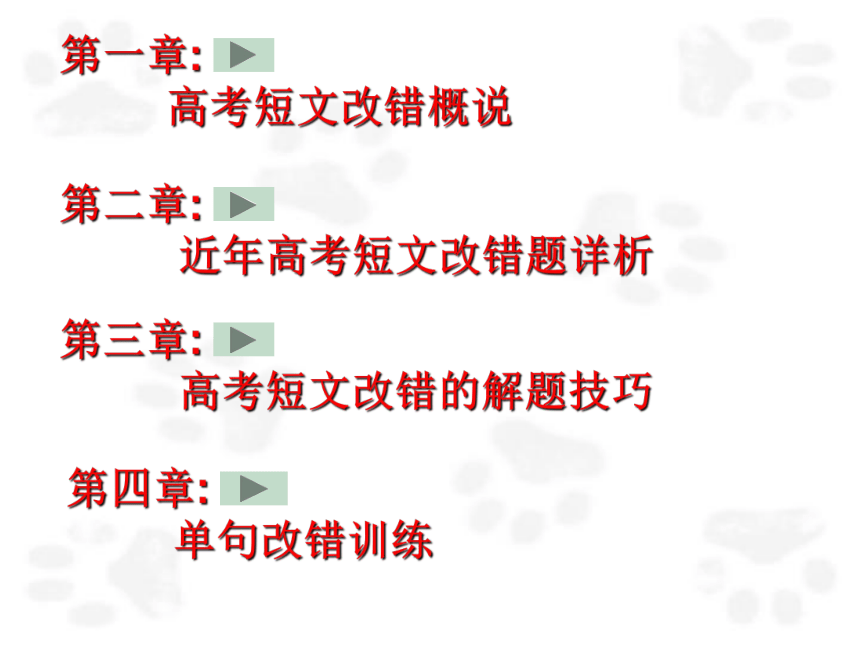
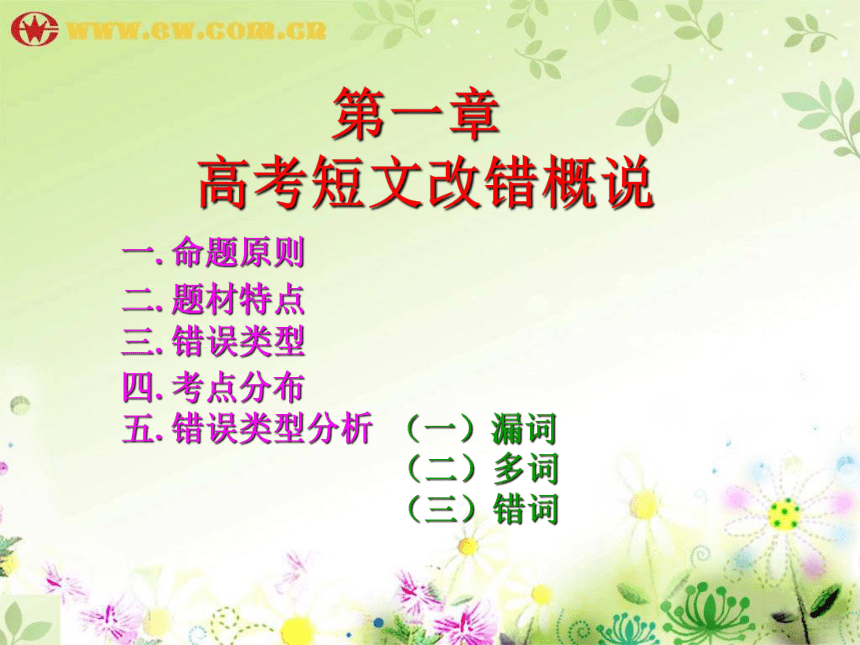
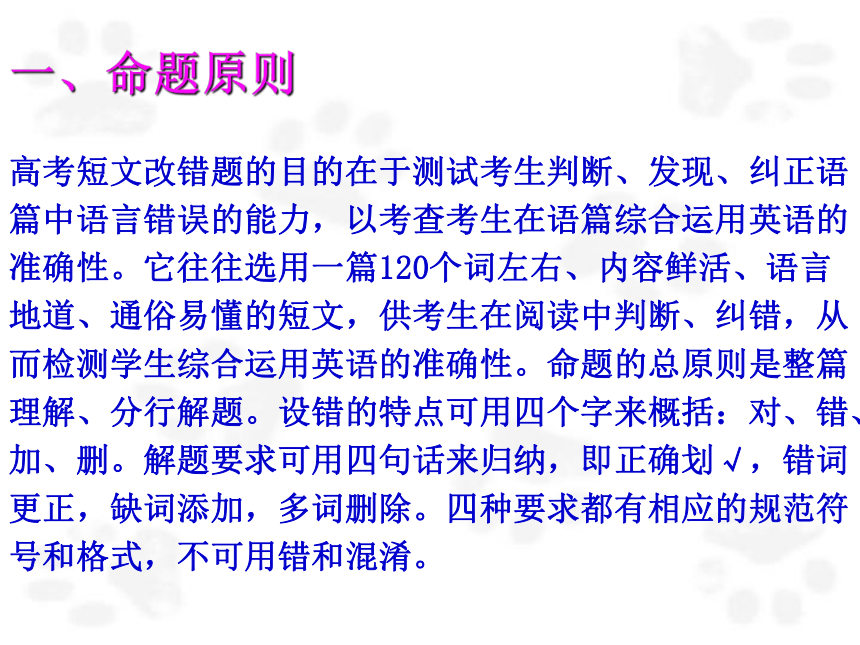
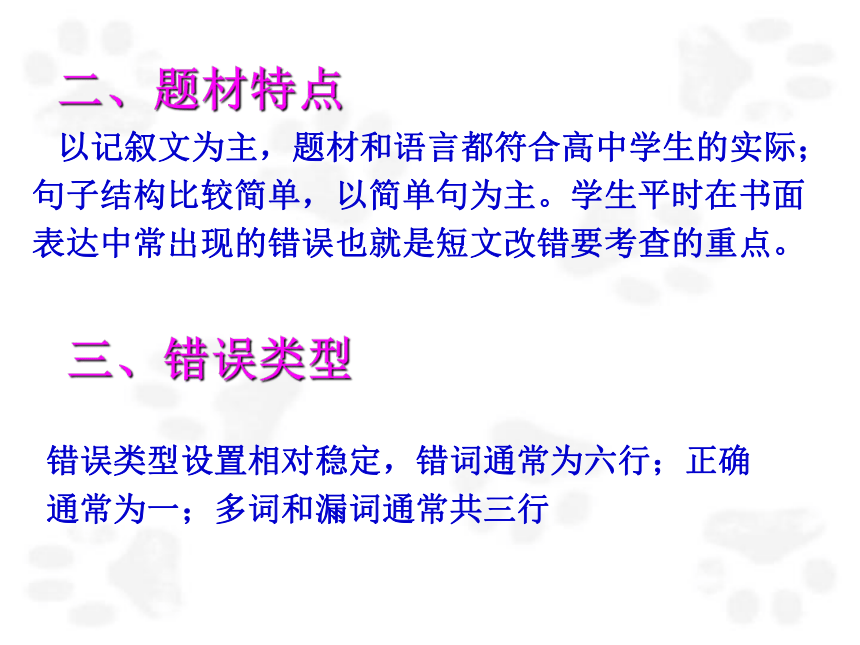
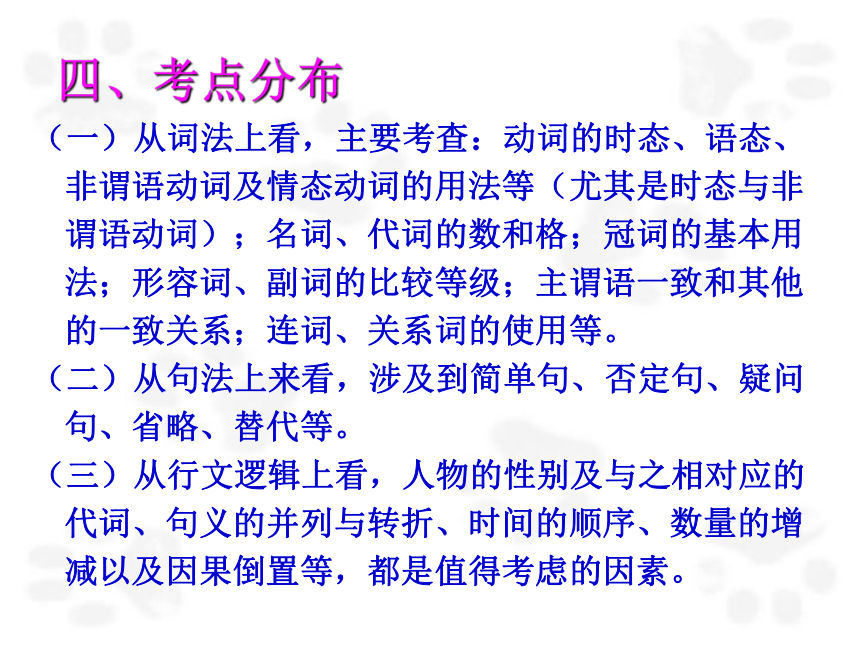
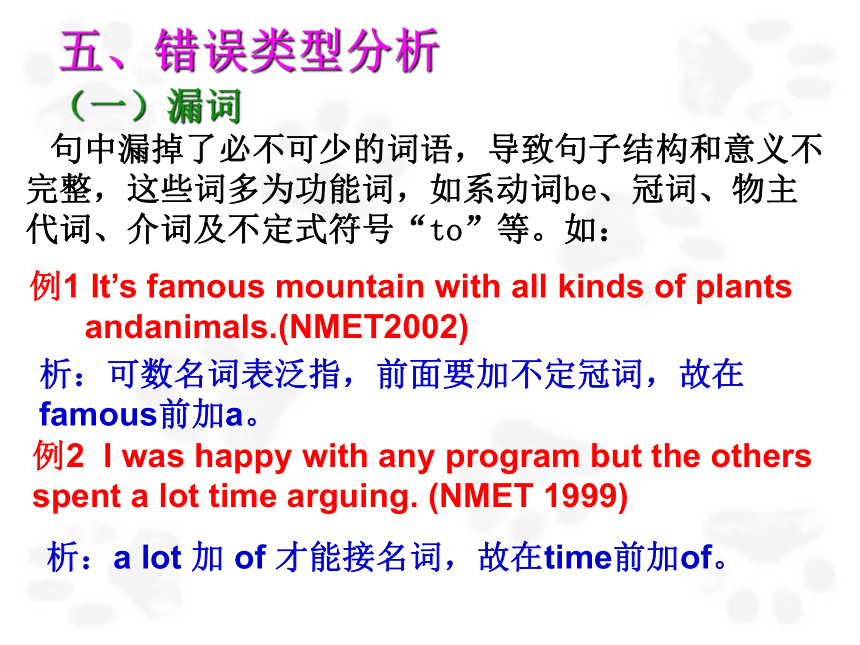
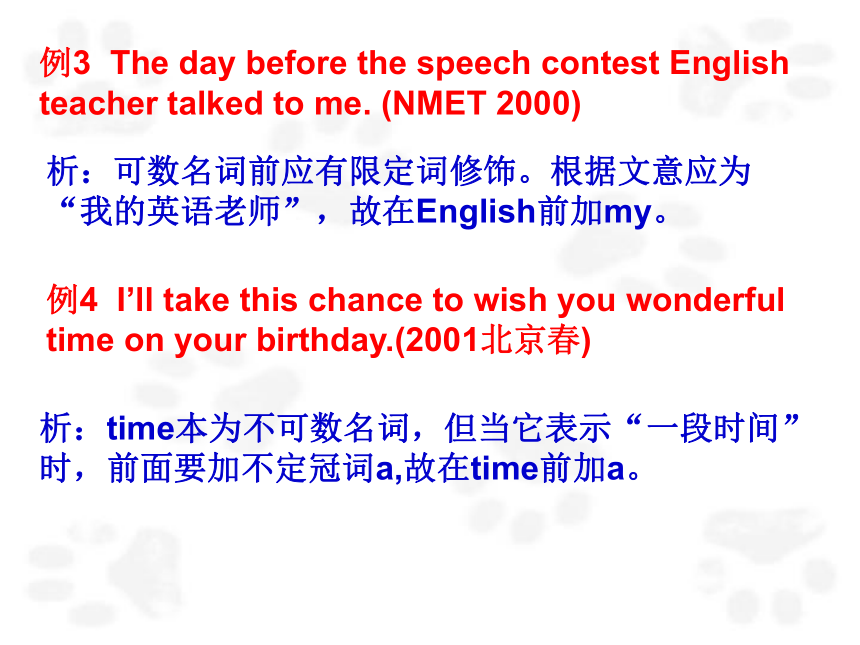
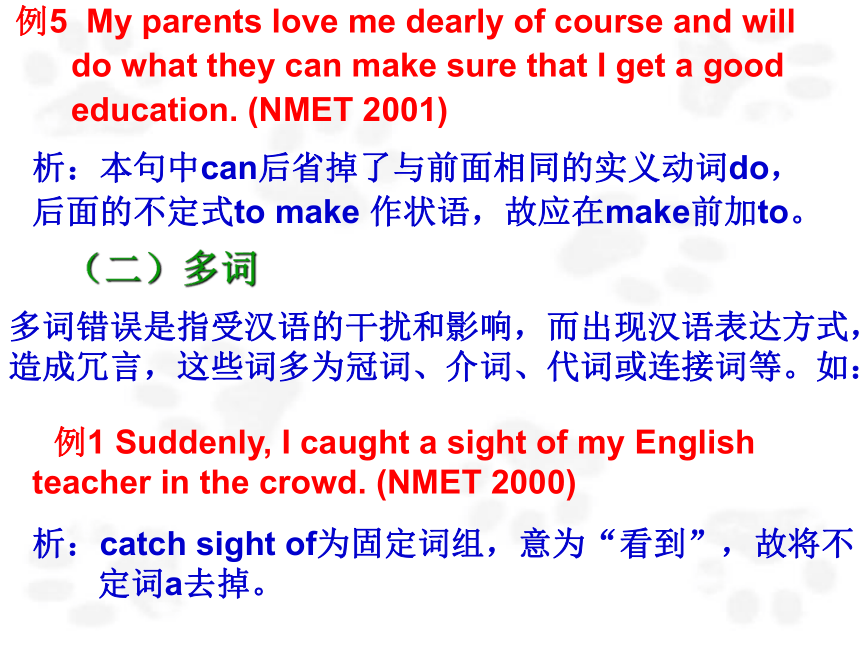
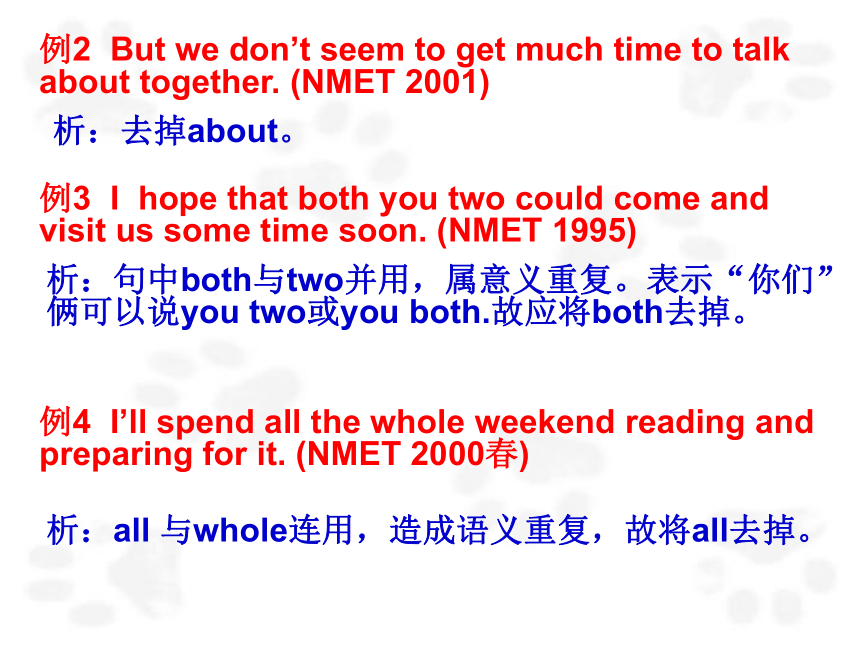
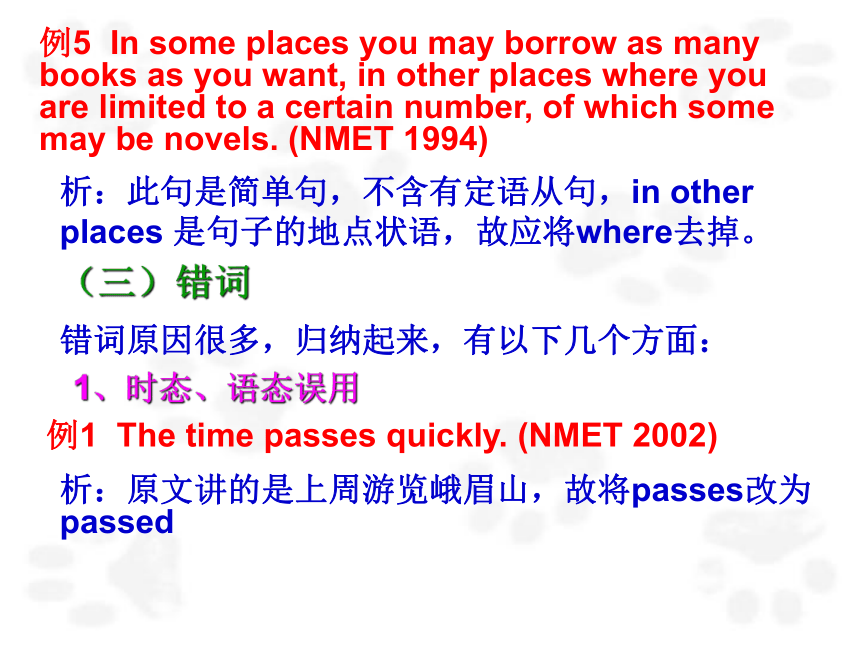
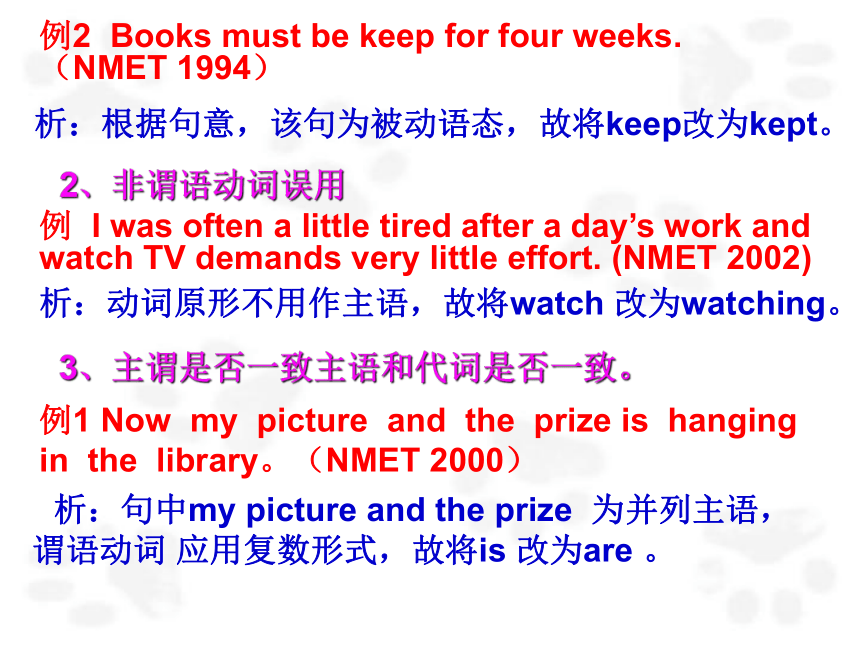
文档简介
(共92张PPT)
短文改错
第一章:
高考短文改错概说
第二章:
近年高考短文改错题详析
第三章:
高考短文改错的解题技巧
第四章:
单句改错训练
第一章 高考短文改错概说
一.命题原则
二.题材特点
三.错误类型
四.考点分布
五.错误类型分析 (一)漏词
(二)多词
(三)错词
一、命题原则
高考短文改错题的目的在于测试考生判断、发现、纠正语篇中语言错误的能力,以考查考生在语篇综合运用英语的准确性。它往往选用一篇120个词左右、内容鲜活、语言地道、通俗易懂的短文,供考生在阅读中判断、纠错,从而检测学生综合运用英语的准确性。命题的总原则是整篇理解、分行解题。设错的特点可用四个字来概括:对、错、加、删。解题要求可用四句话来归纳,即正确划√,错词更正,缺词添加,多词删除。四种要求都有相应的规范符号和格式,不可用错和混淆。
二、题材特点
以记叙文为主,题材和语言都符合高中学生的实际;句子结构比较简单,以简单句为主。学生平时在书面表达中常出现的错误也就是短文改错要考查的重点。
错误类型设置相对稳定,错词通常为六行;正确通常为一;多词和漏词通常共三行
三、错误类型
四、考点分布
(一)从词法上看,主要考查:动词的时态、语态、非谓语动词及情态动词的用法等(尤其是时态与非谓语动词);名词、代词的数和格;冠词的基本用法;形容词、副词的比较等级;主谓语一致和其他的一致关系;连词、关系词的使用等。
(二)从句法上来看,涉及到简单句、否定句、疑问句、省略、替代等。
(三)从行文逻辑上看,人物的性别及与之相对应的代词、句义的并列与转折、时间的顺序、数量的增减以及因果倒置等,都是值得考虑的因素。
五、错误类型分析
(一)漏词
句中漏掉了必不可少的词语,导致句子结构和意义不完整,这些词多为功能词,如系动词be、冠词、物主代词、介词及不定式符号“to”等。如:
例1 It’s famous mountain with all kinds of plants
andanimals.(NMET2002)
析:可数名词表泛指,前面要加不定冠词,故在famous前加a。
例2 I was happy with any program but the others spent a lot time arguing. (NMET 1999)
析:a lot 加 of 才能接名词,故在time前加of。
析:time本为不可数名词,但当它表示“一段时间”时,前面要加不定冠词a,故在time前加a。
例4 I’ll take this chance to wish you wonderful time on your birthday.(2001北京春)
析:可数名词前应有限定词修饰。根据文意应为“我的英语老师”,故在English前加my。
例3 The day before the speech contest English teacher talked to me. (NMET 2000)
例1 Suddenly, I caught a sight of my English teacher in the crowd. (NMET 2000)
例5 My parents love me dearly of course and will
do what they can make sure that I get a good
education. (NMET 2001)
析:本句中can后省掉了与前面相同的实义动词do,
后面的不定式to make 作状语,故应在make前加to。
(二)多词
多词错误是指受汉语的干扰和影响,而出现汉语表达方式,
造成冗言,这些词多为冠词、介词、代词或连接词等。如:
析:catch sight of为固定词组,意为“看到”,故将不
定词a去掉。
例2 But we don’t seem to get much time to talk about together. (NMET 2001)
析:去掉about。
例3 I hope that both you two could come and visit us some time soon. (NMET 1995)
析:句中both与two并用,属意义重复。表示“你们”俩可以说you two或you both.故应将both去掉。
例4 I’ll spend all the whole weekend reading and preparing for it. (NMET 2000春)
析:all 与whole连用,造成语义重复,故将all去掉。
析:此句是简单句,不含有定语从句,in other places 是句子的地点状语,故应将where去掉。
例5 In some places you may borrow as many books as you want, in other places where you are limited to a certain number, of which some may be novels. (NMET 1994)
(三)错词
错词原因很多,归纳起来,有以下几个方面:
1、时态、语态误用
例1 The time passes quickly. (NMET 2002)
析:原文讲的是上周游览峨眉山,故将passes改为passed
析:句中my picture and the prize 为并列主语,谓语动词 应用复数形式,故将is 改为are 。
例2 Books must be keep for four weeks.(NMET 1994)
析:根据句意,该句为被动语态,故将keep改为kept。
2、非谓语动词误用
例 I was often a little tired after a day’s work and watch TV demands very little effort. (NMET 2002)
析:动词原形不用作主语,故将watch 改为watching。
3、主谓是否一致主语和代词是否一致。
例1 Now my picture and the prize is hanging in the library。(NMET 2000)
例2 The Smiths did his best to make me feel at home (NMET1996).
析:句子的主语为复数(the Smiths=史密斯夫妇或史密斯一家人),与之相应的人称代词his应改为their.
4、形容词和副词(比较等级)的误用
例1 As a result, people in the modern world generally live much more longer than people in the past. (NMET 1999)
析:longer本身即构成比较级,故将more去掉。
例2 After learning the basic of the subject, nothing else seemed very practically to me.(NMET 2001春)
析:连系动词后要用形容词,故将practically改为practical
.析:此句中含一个感叹句作told的宾语, 故应将that 改为what才正确。
例2 I told Mother, Father, Sister and all my friends that a great time I had,(NMET 1995)
析:这里具有明显转折意义,需把and改成but。
例1 The food was expensive and the service was good.(NMET 2002)
5、连接词的误用
6、思维定势的干扰
例 I also enjoyed the evening when we spent together.(NMET 1995)
析:尽管evening 是时间名词,但是spend是及物动词,需要关系代词作宾语,故应将when改为which/that,或者将when去掉。
7、句式结构中平行、并列关系混乱
例1 It was very kind of you to meet me at the railway station and drove me to your home . (NMET 1996)
析:句中drove应改为drive,才能与前面的to meet 平行并列关系。
析:根据上文可知,电视机卖掉以后全家人都看书,故应someone改为everyone.
例 Now someone at home reads instead.(NMET 1999)
8、行文逻辑错误
析:通过fed与told可知visiting需改为visit。
例2 As we climbed the mountains, we fed monkeys, visiting temples and told stories.(NMET 1999)
第二章 高考短文改错题详析 (1996-2003)
1996年高考题(保留原题序号,下同)
Today I visited the Smiths-my first time visit 86---
【答案和解析】本文记述了作者第一次访问一
个 美国家庭的情况。
to a American family. They live in a small 87---
town. It was very kind for them to meet me 88--
at the railway station and drove me to their home. 89--
86、去掉time。 My first visit表示“我的第一次访问”。
87、a改为 an。American是以元音音素开头
的单词,且family为单数可数名词
88、for改为of。It’s very kind of sb to do sth 是
一惯用句式,本句式中sb与该句的形容词存在主谓
关系.而it’s+adj.+for sb to do句式中,sb与形容词不
存在主谓关系。
89、drove改为drive。Drive和meet为平行结构,
是两个并列的动词不定式(后一个不定式省略to)。
The Smiths did his best to make me feel 90–
at home. They offered me coffee and other 91--
drinks. We have a good time talking and laughing 92--
together. They eager to know everything about 93--
China and asked me lots of question. In fact. 94--
They are planning to visit China in next year. 95___
90、将his改为their。The Smiths指“史密斯
一家人或史密斯夫妇”
91:正确。
92、have 改为had。短文基本时态为一般过去时。
93、eager前加were。系表结构缺少连系动词。
94、question改为questions。受lots of修饰,
question要用复数形式。
95、去掉in。当next, last, this, that等限定词修
饰时间状语时,前面一般不用介词。
Dear Bob, (1997年高考题)
Hello. I learn about you from my English teacher, 86--
【答案和解析】本文是一封写给笔友的信。
Miss Fang. I’d like to your penfriend, and get to 87--
know more about your country.
First, let me tell you something more about myself. 88–
My name is Li Hua. I live in Beijing, where is the 89--
Capital of China. I go to Hongqi Middle School. 90--
86、learn改为learned。Learned动作发生在写信之前。
87、to后加be 或become。Would like to句型中,
to为不定式符号,后面需接动词原形。
88、去掉more。这是第一次给笔友写信,more
在此词不达意。
89、where改为which。非限定性定语从句缺少
主语,where只能作状语。
90、正确。
We study quite a few subject such as maths,Chinese,91-
English and physics. I use to play ping-pong a lot 92-
In my spare time, but now I am interesting in 93-
Football. Do you play any ball games What your
favourite 94-
Sport I look forward to hear from you soon. 95-
Yours,
Li Hua
91、subject改为subjects。A few后接可数名词的复
数形式。
92、use改为used。Used to do sth为一固定结构,
表示“过去常做……”。
93、interesting改为interested。Be interested in
意为“对……感兴趣”。
94、what后面加is。本句缺少谓语动词。
95、hear改为hearing。Look forward to短语中,
to为介词,后加名词或动名词作宾语。
1998年高考题
My Favourite Sport
My favourite sport was football. I am a member of 86
【答案和解析】本文介绍了作者喜爱的足球运动。
our school football team.We practise for three times. 87
every week and often watch football match on TV 88
together. Play football not only makes us grow up 89
tall and strong but also give us a sense of fair play and 90
86、was改为is。本文的基本时态为一般现在时
87、去掉for。在频率的名词前通常不加介词。
88、match改为matches。Matches为名词复数表示类别。
89、Play改为Playing。动词原形不能直接用作主语。
90、give改为gives。Gives和makes为平行结构,构成
并列并列谓语动词。
team spirit. We must keep in mind that we play 91
for the team instead ourselves. Also, the sport 92
teaches us the important of obedience(服从),Each 93
Player must obey captain,who is the leader of 94
the team. And they must not break the rules too 95
often if we want to win the game.
91、正确。
92、instead后加of。Instead of为固定短语。
93、important 改为importance。Teach后可接名
词或代词作宾语,但不接形容词作宾语。
94、captain前加冠词the。Captain为特指
95、they改为we。根据句意,主从句的主语应该
一致。often if we want to win the game.
1999年高考题
The Problem with Television
Now I can’t watch much television,but a few years ago, 86
[答案和解析]本文作者讲述了家里因看电视而引起的问题
I was used to watch it every night. I was often 87
a little tired after a day’s work and watch TV 88
demands very little effort. Unfortunate, there are 89
too many people among my family. Some wanted 90
86、去掉much。作者现在根本就不看电视了
87、去掉was。Used to do sth意为“过去常常做……”,
而be used to doing sth则表示“习惯于做……”。
88、watch改为watching。Watching在此句中作主语。
89、Unfortunate为Unfortunately. 用副词,作状语
90、among改为in.此处my family 为“我的家庭”,
因此不用among。
to see the programme while others preferred 91.
another. I am happy with any programme but 92.
the others spent a lot time arguing and there 93.
was no way of settling the matter except by 94.
selling the set.Now someone at home reads instead. 95.
91、the改为one。One与下一行的anoother构成
“一个……另一个”。
92、am改为was。全文都是叙述过去的事情
93、a lot后加of。a lot不能直接修饰名词。
94、正确。
95、someone改为everyone 或everybody。
从全文语义来看,应为“每一个人”。
2000年高考题
The day before the speech contest English teacher 86.
【解析】本文讲述一学生在老师的鼓励下,参加演
讲比赛获胜的故事
talked to me.She said that she and my schoolmate all 87
wished me success, but it didn’t matter that I would 88
win or not.When I was on the stage the next day, I
felt so 89
nervous as I shook like a leaf. There were so many
people 90.
86、English前加my。Teacher为单数可数名词 前
面要有限定词。
87、schoolmate改为schoolmates。从常识判断,校
友肯定不只一个。
88、that改为whether。Whether常与or not搭配,
表示“是否”之意。
89、正确。
90、as改为that。本句为so…that…句式,后面是
一个以that引导的结果状语从句。
present ! Suddenly, I caught a sight of my English
teacher in 91.
the crowd, She was smiling but nodding at me. I
remembered 92.
her words and calm down. I did a good job and
won the first 93.
prize. Now my picture and the prize is hanging
in the library. 94.
Whenever I see them I will often think of my English teacher. 95.
91、去掉a。catch sight of(看见、瞥见)为一固
定用法。
92、but改为and。Smiling和nodding两个并列谓
语之间, 没有转折意味。
93、calm改为calmed.从前一句可知道时态为一
般过去时。
94、is改为are.因为主语是my picture and the prize。
谓语动词要用复数。
95、去掉often。有whenever,再用often,意义重复。
2001年高考题
Like most of my schoolmates. I have neither brothers
nor 76
sisters, in any other words, I am an only child. My
parents 77
love me dearly of course and will do all they can
make sure 78
76、正确。
77、去掉any。In other words 为一固定短语,
意思是 “换句话说”。
78、在can后面加to。They can后面承前省去了一个
do, they can在此是定语从句修饰all,后面的不定式
to make sure作目的状语,故to在此不能省。这句话
的意思是“父母亲做他们力所能及的事情,来保证我
得到良好的教育”。
that I get a good education. They did not want me to do
79
any work at family; they want me to devote all my
time to 80
my studies so that I’ll get good marks in all my
subject. We 81
may be one family and live under a same roof.
but we do 82
79、did改为do。整篇文章基本时态为一般现在时,
此处用一般过去时态,显然错误。
80、family改为home。at home为固定短语。
81、subject改为subjects。请注意前面的all。
82、a改为the。same前应用定冠词。
not seem to get much time to talk about together.
It looks 83
as if my parents treat me as a visitor and a guest.
Do they 84.
really understand their own daughter What things
are in 85.
other homes, I wonder.
83、去掉about。about后面没有宾语,about显属多余。
84、and改为or。a visitor和a guest应是选择关系。
意思是“好像我我的父母亲把我当作一个来访者或
一个客人”。
85、What 改为 How。“我想知道其它家庭的情况是
怎样的”。
2002年高考题
Last week my parents and I took a two-day trip to Emei
Mountain in Sichuan. As everyone knows. it’s famous 76
mountain with all kinds of plants and animals. The
weather 77
Was fine. It was about noon we arrived at the foot of 78
The mountain. The three of them were very excited.
As we 79
climbed the mountain, we fed monkeys, visiting temples 80
76、在famous前加a, 注意mountain是单数可数名词。
77、正确。
78、we前加when,时间状语从句缺少连词引导。
79、them改为us.短文为第一人称。
80、visiting改为visited。Fed, visited, told为并列谓语。
and told stories. On the way I was busy taking
picture 81
since the scenery was so beautiful. The time passes
quickly. 82
Evening came down. We spent the night in a hotel
at the top 83
of the mountain. The food was expensive and the
service was 84
good. I was so tired that I fell asleep at the moment 85
my head touched the pillow.
81、picture要用复数形式pictures.。
82、passes改为passed,整个文章基本时态一般为过去时。
83、去掉down。
84、and改为but,因为此处意义发生转折。
在此用作连词,相85、去掉at。the moment当于
as soon as。
2003年全国高考题
When I first learned to write in English, I ran into
many 76
difficulties. The main problem was in that I always
thought 77
in Chinese and tried to translate anything into English.
78
My teacher advised me to keep my diary. I followed her
79
advice and should put down 100 words or so each day. 80
76、正确。
77、去掉in。was后面是一个以引导的宾语从句,
in是多余的。
78、anything改为everything。anything意为“任何事”,
与句意不符。everyhing意为“所有的事”,符合句意。
79、my改为a。
80、去掉should. put和followed是平行结构,作并列谓语。
Soon I began to enjoy talk to myself on paper as I was 81
learning to express me in simple English. One day I
wrote 82
a little story and showed to my teacher. She liked it 83
very much and reads it to the class. All said the story
was 84
a good one. Their word were a great encouragement to
me. 85.
81、talk改为talking。enjoy后面要求接动名词作宾语。
82、me改为myself。Express oneself为一固定结构,
意为“表明意思、意见,表达思想”。
83、showed后加it。showed在此作及物动词,后面
缺少宾语。
84、reads改为read. liked和read为平行结构,是并列谓语。
85、word改为words。在此表示“他们的话”之意。
第三章
高考短文改错的解题技巧
一.短文改错真题分析示范
下面就2003年全国高考短文改错题,谈谈短文改错题的解题技巧。
小结:2003年高考短文改错题涉及到的语言测试点有:动词时态2个,名词复数1个,冠词1个,介词1个,代词3个,非谓语动词1个。由此可见,善于进行语法分析是做好短文改错题的关键。
二.短文改错题思路点拨
(一)注意语篇环境,侧重语法分析
首先,要认真阅读全文,弄懂文意,了解文章所创设的语言环境,为正确判断创造条件。做题时,要避免“只见树木,不见森林”的现象。眼光不能只盯在单句上,而是要跨越句子层次,从整体的角度,从语篇的角度来分析考虑问题。如第80、84题,如果眼光只局限于当前 句,恐怕就很难发现错误。做题思考的切入点应放在语法分析上。
(二)注意若干一致性问题
一致性问题也是短文改错题常见的测试点。尤其要注意平行和并列结构。如2003年的短文改错题,从全局考虑,我们就可以发现许多一致性问题。80题put down与平行结构followed的时态不一致;
第84题reads与平行结构liked的时态不一致;第85题Their word were a great……主谓不一致等。
在做题的过程中,主要查看的一致关系包括主谓是否一致,代词与指代物是否一致,比较对象和范围是否一致,时态是否呼应,逻辑和语篇结构是否一致等。如:
Between the two buildings stand a hospital.
分析:stand改为stands。此句为倒装句。主语应为hospital,而非buildings。
又如:Both of his parents were ill. so he sent for a doctor to see him.
分析:him改为them。父母亲是两人,应用them来代。
(三)注意词的形式的误用
动词要查看时态、语态、非谓语形式是否误用;名词查看单复数是否误用;冠词要查看是否漏掉或误用;介词要查看搭配是否误用;形容词、副词要查看三级及相互之间是否误用。如81题enjoy后面误用了动词原形,85题为名词复数误用单数。
又如:She looked angrily at the news on the radio.
分析:angrily改为angry。“at the news”相当于“on hearing the news”,故looked为连系动词,后面要求形容词。
再如:A 18-meter-long bridge will be built here.
分析:A改为An.“18”的英语读音以元音开头。
(四)注意从(分)句的连接是否恰当
要注意那些表示因果、让步、递进、转折、并列等关系的连接词使用是否恰当,是否有遗漏或误用现象。
如:He knows a lot about radio, and he is young.
分析:and改为though。后面意义转折。
(五)注意固定搭配、行文逻辑及一般常识
固定搭配,只要平时熟记,改出来应该是不会难的。例如:第82题,如果你知道express oneself 这一固定搭配。改出来应该是不成问题的。逻辑方面的错误,应该从语境的角度来考虑。
如:He hardly did physical exercise, so he became as strong as a horse.
分析:so改为but。既然几乎不进行体育锻炼,又怎么会强壮如牛呢?前后矛盾。
又如:It’s` two years since his husband died.
分析:his 改为her。“他”怎么会有“husband”呢?
(六)注意四个不改
单词拼写不改;大小写不改;词序错误不改(应从错词或少词方面去考虑);标点符号不改。
(七)注意解题规范
要严格按照示范用规定的符号改错,切勿离开文后的10道横线在原文的字里行间勾勾划划、涂涂改改。要记住,“√”、“-”、“∧”、“\”、分别代表正确无误、错词纠正、缺词填补、多词删除。切忌用文字说明或用箭头表示。
如以下做法是错误的,在高考中是要扣分的:
1.Many people are like sports all over the world
去掉are
2.Therefore, there are still some countries where people have shorter lives.
Therefore 改为However
3. I got lost and must ask a policeman the way.
将must改为had to.
4. But how sleep do we actually need
在sleep前加much
三.短文改错解题步骤
(一)通读全文,确认时态
动词是语句的核心,也是描述事物的主要手段。一篇短文的基本时态若确定,其它时态、语态等动词的相关形式也就有章可循、有法可依了。
(二)整句理解,分行搜索
短文改错的命题形式是在文章的后面划出标有题号的10行横线供考生作答。10行的划线与句子的始末并非一致。也就说,短文改错是以句为阅读单位,以行为解题单位。这就要求考生在解题时按句子整体理解上下文,同时又在每一行仔细搜索,判断正误。
(三)复读检查,前后贯通
将所改答案放入文中通读一遍,依靠平时积累的词语、语法和惯用语用法知识及语感,检测修改后的文章看是否通达顺畅。
复读过程中,既要重视词语、句子的字面含义,又要弄清文字段落内在的含义和逻辑关系,以及结构的完整、规范,如发现语句不通或不合逻辑,则应重新修改。
第四章
单句改错训练
第一节
多词的7种情形
第二节
漏词的6种情形
第三节
错词的12种情形
近几年的高考短文改错题,设错方式比较固定:正确为1个,多词或缺词共计3个,错词为6个,其比例为1:3:6. 下面就这三种错误类型进行单句改错练习。
第一节 多词的7种情形
一、多冠词
1.On the bus I caught a sight of my English teacher.
2.Wish you a good luck.
3. Sometimes I go to school by a taxi.
catch sight of 为固定搭配,去掉a .
luck为不可数名词,表泛指,不用冠词。去掉a。
与by连用的交通工具表方式时,名词前不用冠词。
去掉a.。也可将by 改为in。
4. I didn’t go to the bed until midnight last night.
5. Jim was scolded for sleeping in the class.
6. A girl as she is, she is very fond of boxing.
7. Tom is my the best friend.
go to bed表示“上床睡觉”时,不用冠词,去掉the。类似的动词词组还有:go to church, go to town. Go to hospital, go to college, go to school等。
in class意为“上课时”,in the class意为“在这个班”。
as 或though引导的让步状语从句,构成倒装结构时,前置的名词不用任何冠词。去掉 A。
形容词最高级前有形容词物主代词,不能再加定冠词the。去掉the。
8. At last he turned a writer.
9. He came into the classroom, a book in hand.
10. She often watches TV news at the noon.
11. What do you often have for the breakfast
12. I prefer playing the piano to playing the football.
13. What a fine weather it is!
turn 作连系动词表“成为”时,后面的名词不能用冠词。去掉a。
省略with 的独立主格结构,冠词和后面的人称代词要一并省略。去掉a。
at noon 为固定用法,不加冠词。去掉第二个the.
一日三餐前不加冠词。去掉the。
球类运动、棋类游戏前,不用冠词。去掉第二个the。
去掉a。weather为不可数名词。
14. There is a car waiting in the front of the classroom.
15. We elected him a monitor.
16. He worked hard, and succeeded at the last.
17.She wants to buy a clothes today.
18.Hapyy the New Year!
去掉the。in the front of 表示“在……(内部的)”前 面”,显然与句意不合。
去掉a。“elect sb +职位”前不加冠词。
去掉the。at last(最后)为固定搭配。
去掉a。clothes表复数意义,前不能加不定冠词a。
去掉the。Happy New Year!(新年快乐!)为固定搭配。
二、多介词
1.When we reached to the village, it had been dark.
2.The teacher entered to the room with a ruler in her hand.
3.On hearing the news, the murderer fled from Hong Kong
4.We should serve for the people heart and soul.
5.The girl married with an American banker.
6.The mother dressed for her son.
reach是及物动词。去掉to。也可将reached 改为got。
enter是及物动词。去掉to。
flee 是及物动词。去掉from。
serve 是及物动词。去掉for。
marry是及物动词。去掉with。
dress是及物动词。去掉for。
7.Has the boss paid to the workers
8.Do the clothes fit for you
9.Every soldier should obey to the officer.
10.In the course of the conversation we mentioned to the
teachers who had taught us at school.
11.During his stay in Beijing, his uncle accompanied
with him.
12.Many people go to abroad in the hope of making
more money.
pay是及物动词。去掉to。
fit是及物动词。去掉for。
obey是及物动词。去掉to。
mention是及物动词。去掉to。
accompany是及物动词。去掉with。
abroad是副词,其前不用介词to。去掉to。
13.We will hold a writing competition in this week.
14.We walked into the lab, following after the professor.
15.We listened to, but heard nothing.
16.I am sorry for that he won’t come here.
17.Because of she is ill, she can’t come to school.
18.On the way to there, he found his necklace gone.
19.He usually goes to work by bike except for that it rains.
20.I can reach at the city tomorrow morning.
this, that , last所构成的时间状语前不再加介词.去掉in。
follow是及物动词。去掉after。
listen后如果没有接宾语,不能加to。去掉to。
sorry后面接从句,不能再用for。去掉for。
去掉of。because of后面接单词或词组,不接句子。
去掉to。 there为副词,前面不能有介词。
去掉for。Except for 后要接名词或代词。
at去掉。Reach为及物动词,可直接接名词。
三、多代词和副词
1.I do remember you having apologized to the old lady I
met her last week.
2.Do you know the person who she is standing over there
3.The recorder that we bought it yesterday is very
expensive.
4.In the last five years that they have built many tall
buildings.
5.In other places where you are limited to a certain number of the books.
去掉her。定语从句已有宾语。
去掉she。定语从句已有主语。
去掉it。定语从句已有宾语。
去掉that。这是一个简单句。
去掉 where。这是一个简单句。
6.Would you mind your opening the window
7.This book is too hard for me to read it.
8.She is such a lovely girl as everyone likes her.
9.The stone is too heavy for us to lift it.
10.Do you know the man I talked with him just now.
去掉 your。谓语动词的主语和动名词的逻辑主语是
相同的,没有必要用动名词的复合结构。
去掉 it。
去掉her。 As引导一个定语从句,且在句子中作宾语,不能再用 her。也可将 as改为 that而保留 her。
去掉 it。
去掉 him。定语从句已有宾语。
四、多连词
1.Sitting on the chair, and he began to work.
2.Though he tried his best, but he failed.
3.Because he is ill, so he can’t go to school today.
4.The more he has, and the more he wants.
5.She was absent from the meeting because that she is ill.
6.I found that her lying on the ground.
7.She sat near the fire, and knitting.
去掉and。现在分词作状语,主句不能再用连词。
去掉but.并列和从属连词不能同时用在一个主从复合中.
去掉so.并列和从属连词不能同时用在一个主从复合中.
去掉and 。
去掉that。已有连词 because 。
去掉that。此句为简单句,found后直接接双宾语。
去掉and。现在分词作状语,主句不能再用连词。
8.If it rains tomorrow, and I’ll stay at home reading the
novel.
9.When you are in trouble, and come to me.
10.Since you’re young, so you shouldn’t be too afraid of
making mistake
五、多动词
1.I was used to go swimming on the shore in summer.
2.We were visited the farm the other day.
去掉and。If引导的条件状语从句中,I’ll……为主句。
去掉and. When引导的是时间状语从句,come to me为主句。
去掉so。Since引导的为原因状语从句,you
shouldn’t …为主句。
去掉was。used to表示“过去常常发生的动作或状态”。
去掉were。动词的一般过去时态用动词的过去式即可。
3.He explained said that he was very busy.
4.He unpacked open the package when he got home.
5.Please give me a book to be read.
6.The story was happened in the Tang Dynasty.
7.The war broke out in 1939 and was lasted for 8 years.
8.The house was belonged to the Smiths.
9.The silk was felt very smooth.
10.If I shall have time tomorrow, I’ll help you .
去掉said。两个动词意义重复,且不合英语语法。
去掉open。意义重复。
去掉be。不定式作定语,用主动形式,表示被动意义。
去掉was。Happened是不及物动词,不能用于被动语态。
去掉was。lasted习惯上不用于被动语态。
去掉was。 belonged to不能用于被动语态。
去掉was。连系动词feel不能用于被动语态。
去掉shall。If引导的条件状语从句用一般现在时表将来。
六、多不定式符号to
1.I saw him to fall off the bike just now.
2.I would rather walk to the cinema than to take a taxi.
3.Why not to try taking a boat to go there
4.I could do nothing but to wait there.
5.You’d better to lose some weight.
6.If she comes here, I will let you to know.
7.I heard him to sing just now.
去掉to。See后面用不定式作宾补要省略to .
去掉to。Would rather…than 后面的不定式要省略to。
去掉to。why not do sth 句式不能用to。
去掉to. But作介词,后面如接不定式,前面有do的话不定式不能用to。
去掉to。Had better 后面不能用to。
去掉to。Let后面用不定式作宾补要省略to。
去掉to。Hear sb sing(听全过程)或hear sb singing
(听某要正在唱歌)。
七、词义重叠
1.When he returned back to the school, all the students had left.
2.Would you please repeat again what you said just now
3.We are trying to improve better our living conditions.
4.He masters English well.
5.English is my most favorite subject at school.
6.The film is very wonderful.
去掉back。returned已含有“返回”之意。
去掉again。repeat已含有“重复”之意。
去掉better。improve本身有“提高、改善、更好”之意。
去掉well 。master是“精通”之意。
去掉 most。favorite本身就是“最喜欢的”意思。
去掉very。Wonderful是极限形容词,意为“太棒了”
7.The engineer over there is very excellent.
8.Be sure to get there before the sun sets down.
9.Both of us two will be sent to work in Hong Kong.
10.Whenever I see the photo, I will always think of my
foreign English teacher, Miss Green.
第二节 漏词的6种情形
一、漏冠词
1.This is so important meet that everyone must attend it.
2.The meeting turned out to be failure.
去掉very. excellent 是极限形容词,意思是“非常优秀的”
去掉down。set意思是“(太阳等)落下。”
去掉two。both已含有“两者”的意思。
去掉always。Whenever 已含有此意。
meeting前加不定冠词a。
failure前加不定冠词a。当failure表具体所指时,应加a。
3.I will call on Greens this evening.
4.In 1980’s, farmers rushed into the cities to try their luck.
5.She is more beautiful of the twins.
6.Please pass me pen on the desk.
7.I found a notebook and pencil-box when the door opened.
8.What he wanted to do was to have big dinner
9.What wonderful time you had at the party!
Greens前加定冠词the。the Greens表“格林一家”。
1980’s 前加定冠词the,年代前面要加the。
more前加the。当比较范围比较明确时,需加定冠词the。
pen前加the。表特指。
pencil前加a。notebook和pencil-box为并列成分,
后面的不定冠词不宜省略。
big 前加a。dinner习惯上不加冠词。但当dinner前面有修饰词限定时,要加 a。
wonderful前面要加a。
10.We went to Summer Palace yesterday.
二、漏动词
1.They eager to know everything about China.
2.This bridge 18 meters long.
3.I very happy to meet you.
4.His mother died when he 19 years old.
5.Our school very beautiful.
6.He not at home.
Summer Palace 前加the。 the Summer Palace
(颐和园)为固定搭配。
eager前加are。句子缺少谓语动词。
18前加is。句子缺少谓语动词。
very 前加am。句子缺少谓语动词。
19前加was。句子缺少谓语动词。
very前加is。句子缺少谓语动词。
not前加is。句子缺少谓语动词。
7.My home near the park.
8.He against the suggestion.
9.English taught in many schools.
10.Only then I realize that I was wrong.
11.When the teacher came in ,the students reading.
12.They lived in Beijing since 1990.
13.This building higher than that one.
near前加is。句子缺少谓语动词。
against 前加is。句子缺少谓语动词。
taught 前加is。句子缺少助动词,这是一个被动语态
I 前加did.。这是一个倒装句式。
reading前加were.句子缺少助动词,这是一个过去进行
时态。
lived前加have.句子缺少助动词,此句应用现在完成时态。
higher前加is。句子缺少谓语动词。
三、漏介词
1.The music is nice to listen.
2.We have to find a hotel to stay.
3.I have some personal matters to see.
4.This is what he is worrying.
5.None of us knows who the old man depends.
6.Every child is taken good care.
listen后加to。后面的不定式是主动形式表被动意义。
stay后加at.后面不定式作定语,要用主动形式表被动意义。
see后加to。后面的不定式是主动形式表被动意义,
需用及物动词词组,see to表“处理、关照”之意。
worrying 后加 about. Worry about意为“为…而担心”。
depends后加 on. depend on 后接宾语.宾语为前面的who。
care后加of.这是一个被动语态的句子. take care of为
固定词组。
7.The ice is too thin to skate.
8.The girl never speaks until spoken.
9.These problems ought to be paid special attention.
10.Every minute should be made full use.
11.This picture is worth looking.
skate后加on 。后面的不定式是主动形式表被动意义,
表示“在冰上滑”,on不能省略。
spoken 后加to。这是一个省略句子,完整的句子
是… until she is spoken to。
attention 后加to。这是一个被动语态的句子。
pay attention to为固定词组。
use后加of。这是一个被动语态的句子。
make full use of为固定词组。
looking后加at。后面的不定式是主动形式表被动意义。
12.He was praised because what he had done for the
disabled boy.
13.Abbie was the only creature Kate could talk.
14.He came on foot instead of car.
15.Some of my classmates looks down me.
四、漏不定式符号to
1.His step-mother did all she could help him.
because后加 of。 because of 后面接的是以what引导的宾语从句,而不是原因状语从句。
talk后加to。后面是一个定语从句,关系代词在定语
从句中作宾语,已省略。 Talk不能直接接人作宾语。
of后加by。
down后加on (upon)。look down on (upon)为固定搭配(=瞧不起人)。
could后加to。 Could后承前省略了动词 do,不定式 to help him作目的状语。
2.I have nothing be afraid of .
3.She was made cry by her younger brother.
4.I came here buy the book you mentioned yesterday.
5.The teacher allowed Li Ming to do the experiment,
but I wasn’t allowed.
6.The enemy had no choice but lay down their arms.
7.Everyone wants see the film.
8.It took him ten minutes get to school.
nothing后加to。后面是不定式作定语。
made后加to. 其面不定式作主语补足语时,不能省略to。
here后加to。
第二个allowed后加to. 但省略了不定式。但小品词to不能省。
but后加to。have no choice but后应接带 to的不定式。
wants后加to。
minutes后加to。后面的不定式作句子的真正主语。
9.The boy expected be taken to the zoo.
10.She is too young take care of herself.
五、漏连接词
1.It began to rain, they had to stop their work.
2.You like sports, I’d rather read.
3.Many people are worried about the possibility the
computer will control the mankind.
expected后加to。一些动词如expect,claim,agree等动词后要接不定式作宾语。
too…to…为固定搭配,意为“太…而不能…”
they前加so。后一句是一个表示结果的句子,并列连词so不能省。
I’d前加but,表转折关系。
the computer前加that. that 引导同位语从句时,不能省。
4.My idea is we should do the work right away.
5.You can’t pass the exam, you study hard.
6.You can deceive her for some time, not all the time.
7.The trouble is you can’t come.
8.I wonder I can catch the last bus.
9.She worked hard, failed the exam.
六、漏其他成分
1.The population in China is larger than in America.
we前加that。 That引导表语从句时,不能省。
you前加unless(除非)。
not前加but。表转折。
you前加that。 that 引导名词性从句,不能省略。
wonder后加whether或if。
failed前加but。这样才能合乎逻辑。
in America前加that.比较的对象不恰当.“人口”应
与“人口”比较。
2.Yesterday he bought a pen , but he lost.
3.China is bigger than any country in Asia.
4.Being a hot day, we all went swimming.
5.There are two desks in the room, this one is bigger than
that.
6.This table is small, but that is a big.
7.He called for a waiter, but until now no one comes to
serve.
Lost后加it。 lose 为及物动词,后面少宾语。
country前加other。因为中国属于亚洲,比较时,应把“中国”排除。
Being前加it.主句的主语we ,并不是being的逻辑主语,
being需要有自己的逻辑主语,构成独立主格结构。
that后加one。 this one 与that one构成平行结构。
big后加one. big是形容词,不能作名词.也可在that后加one.
serve为及物动词,后面少宾语,后要加him。
8.She is taller than any student in our class.
第三节 错词的12种情形
一、冠词使用错误
1.After a hour or so he began to feel a little tired.
2.We may be one family and live under a same roof.
3.They were admitted into an university in Beijing.
4.A day I met a foreigner while walking along the street.
5.There is a “x” in the word “text”.
二、代词使用错误
any后加other。要把she排除在外。
第一个a改为an。Hour以元音开头。
a改为the。Same前习惯上用定冠词,不用不定冠词。
an改为a。university以辅音音素开头。
A改为one。one day为习语,意为“一天”(用作状语)
a改为an。x以元音开头。
1.The Greens tried his best to help me.
2.I won’t forget the gift you sent I on my birthday.
3.His parents went to New York last year, and none of them wrote to him.
4.There is hardly nothing worth listening to in his talk.
5.The dog is always kind to it’s owner.
6.—Is anyone here —Yes, all are here.
7.My glasses are missing , and I am looking for it.
his改为their. the Greens指“格林一家”,代词应用their。
I改为me。人称代词 me作宾语,要用宾格。
none改为neither 。parents是“父母二人”。
nothing改为anything.因是“几乎不”,已有否定含义。
it’s改为its。代词“它的”正确形式是its。
anyone改为everyone. Is everyone here 表示“所有的人
都到了吗?”而Is anyone here 则表示“是否有人来了?”,
it改为them. Glasses是复数意义名词,用them或they代替。
三、引导词(连接词、关系词等)使用错误。
1.It doesn’t matter that I will win the match or not.
2.That he is looking for is a dictionary.
3.Many people can quickly get help from a doctor since
they are ill.
4.If you can pass the test is up to yourself.
5.If we will hold the party in the open air depends on the
weather.
6.I live in Beijing, where has a long history.
that改为whether。
That改为What。主语从句缺少宾语,应用what引导。
since改为when或if.因为后面是一个条件或时间状语从句.
If改为Whether。主语从句要用whether引导。
If改为Whether。主语从句要用whether引导。
where改为which。定语从句缺少主语。
7.We still don’t know if or not they have arrived at
Shanghai by plane.
8.It is the tallest tower which can be seen far away.
9.The person about who we talked is my maths teacher.
10.Yesterday we were having our dinner while the
telephone rang.
四、介词选择错误
1.His father has been ill on bed for two years.
2.I have made rapid progress under the help of my teacher.
if改为whether。whether or not为固定用法。
which改为that.定从先行词 tower被最高级tallest修饰。
who改为whom.介词后关系代词指人时只能用whom。
while改为when. When作并列连词,表示“这时(突然)”.
on改为in。in bed为固定用法。
under改为with. With the help of表示“在…的帮助下”。
3.Don’t read under the strong light.
4.The killer ran away to the direction of Beijing.
5.He lives on No.124, Wuyi Road.
6.He is very angry to his son for his failing in the exam
7.He is strict to me in my work.
8.The bottle is filled for the gas.
9.London stands to the Thames.
under改为in.“在…的光线下”正确表示方法为in…light。
to改为in. in the direction of…表示“朝……方向”之意。
on改为at.表示在某门牌号用介词at。
to改为with.表示“对某人生气”应用be angry with sb。
to改为with.be strict with sb 表示“对某人要求严格”;
be strict in sth表示“对某事要求严格”。
for改为with. be filled with意为“装满”。
to改为on.表示“在河的边沿”,用on。
10.His mother took pride of his great achievements.
11.There are two windows on the wall.
12.We are trying to find the answer of the problem.
13.You are required to write your story with your own words
14.With what language did she make the speech
15.He is the cleverest in all the students.
16.At a clear night ,he went out in search of the gold.
17.He had an English party at Christmas Eve.
of改为in.注意介词搭配:take pride in, be proud of
on改为in。
of改为to.表示“……的答案”,应用the answer to。
with改为in。
With改为In。表示用某种语言,用介词in。
in改为of.表比较的对象用of.表比较地点范围用in。
At改为On. On指具体所指的一天晚上。
at改为on.注意比较: at Christmas。
18.Women should be equal with men.
19.He is blind on both eyes.
20.Uncle Tom is famous as his skill in cooking.
21.He will come back after five weeks.
22.He is the tallest between the four of us.
五、时态错误
1.He said that he will see you off at the airport the next day.
with改为to. be equal to(相等的、均等的)为固定搭配.
on改为in.表示眼睛瞎了要用介词in/of。
as改为for. be famous for表示“因某事出名”,
be famous as表示“因某种身份出名”。
after改为in.表“将来一段时间之后”,用in。
between改为among. Between指“两者之间”。
will改为would.因为主句谓语为一般过去时。
2.When they will come back, I’ll let you know.
3.He said that he has had the bike for two years.
4.I work on a farm in North China in the 1970s.
5.A new bridge was being built in our city at present.
6.I feel regretful now because I don’t study hard when I was in high school.
7.If I am you, I would do it.
8.She buys a bike yesterday.
去掉will。时间状语从句用一般现在时表将来。
has 改为had。因为主句谓语为一般过去时。
work改为worked。此句要用一般过去时态。
was改为is。从at present可知,此句用现在进行时。
don’t改为didn’t。根据句意此句要用一般过去时。
am改为were。此句为虚拟语气,要用过去时。
buys改为bought.从yesterday可知,要用一般过去时。
9.He taught here for six years since he came to this town.
10.I am tired because I had been working all day.
11.By this time tomorrow we have finished the work
12.We have to cancel the match if they will not come tomorrow.
六、语态和语气错误
1.Many trees planted yesterday.
taught前加has.表示过去已经开始持续到现在,而且还
可能继续下去的动作或状态,应用现在完成时态来表示。
had改为have.从am可看出是现在时,且句中给出all day,应用现在完成进行时态
have前加shall或will.强调在将来某时刻为止时完成某动作,应用将来完成时态。
will改为do. If引导条件状语从句,用一般现在时表将来。
planted前加were。用被动语态。
2.In some countries , tea is serving with milk and sugar.
3.It is high time you leave for Shanghai.
4.She suggests that her brother not goes to college.
5.How I wish I am as strong as you.
七、非谓语动词错误
1.He was busy get ready for the journey.
2.You will have to pay the cost of send a postcard.
3.What he did was puzzled.
serving改为served 。
leave 改为left. It is time 后从句用虚拟语气.谓动用过去式.
goes改为go. suggest表“建议”,后宾从用虚拟语气
am改为were. Wish后面的宾语从句需用虚拟语气。
get改为getting. be busy后接动词要用现在分词。
send改为sending.介词of后要求用动名词作宾词。
puzzled 改为puzzling. puzzling表“令人疑惑不解”意思。
4.I will spend a week reading and prepare for the
examination.
5.Yesterday I had my bad tooth pulling out.
6.I made a terrible mistake. I regretted not take your
advice.
7.When we reached the top of the mountain., we stopped
have a rest.
8.There’ll be a good film tonight. Remember see it on time!
9.My nephew is looking forward to come to the city.
prepare改为 preparing. 和前面reading是并列结构
pulling改为pulled. have the tooth pulled out表请人拔牙
take改为taking.用动名词表示对已发生过的事情的后悔。
have前加to. Stop的目的是 to have a rest。
see前加to. remember 后接不定式,表示记住要做的事。
come改为coming. look forward to中to为介词,接动词ing
10.When speaking, you must make yourself hear.
11.I feel tiring today.
12.I’ll have my hair cutting.
13.Following by the officers, the general inspected the
army.
14.There is something wrong with my computer, and it
needs repaired.
15.Please burn the falling leaves on the ground.
hear改为heard. 意为“使别人听到自己的话”。
tiring改为tired. Tired是“疲倦的”,tiring是“令人疲倦的”.
cutting改为cut. have sth done“让某人做某事”
following 改为followed.过去分词表被动。
repaired 改为repairing. need后ing主动表被动
falling改为fallen.过去分词作定语,强调动作的完成
16.Losing in thought, he almost ran into a car in front of him.
17.I enjoy listen to the classic music.
18.Judge by what he wears, he is a farmer.
八、主谓一致错误
1.Selling newspapers during the summer vacation not only
makes some money but also give us some working
experience.
2.To repair cars are a tiring job.
losing改为lost。be lost in thought表示“陷入深思”。
listen改为listening。Enjoy后面用动名词作宾语。
Judge 改为Judging。Judging by…为一固定说法。
give改为gives. Makes和gives 为平行结构,作并列谓语.
are改为is.不定式、动名词、主语从句作主语要看作为一个整体,谓语用单数形式。
3.It is Mary who study very hard.
4.The rest of the trees was cut down.
5.The day we have been looking forward to having come
at last.
6.The number of the guests invited to the party are 100.
7.The wounded in the earthquake was sent to the hospital.
8.Tom, as well as his children, are to visit Beijing this
summer.
study改为studies.强调主语,谓动应保持强调句以前状态。
was改为were. rest指可数名词复数形式,谓动用复数。
having改为has.主句主语是The day,后面缺少谓语动词.
are改为is. the number of表示“…数目”,谓动用单数形式.
was改为were. the wounded表“伤员们”时,表复数概念.
are改为is.主语为Tom. as well as结构重心在前一个名词,
谓语动词与前一个名词保持一致。
9.Each side of the street are lined with tall trees.
10.Here “you” are used as a noun.
九、名词错误
1.He drank some waters from the river.
2.Some woman doctors are discussing the operation.
3.During the three week’s holidays, he visited many
famous places.
4.The tenth five-years plan was successfully carried out.
are改为is。Each…作主语时,其后谓语用单数形式。
are改为is。 You在此仅仅被视为一个词,看作单数。
waters改为water。Water是不可数名词。
woman改为women。以man, woman构成的复合名
词变复数时,前后两个名词都要变成复数形式。
week’s改为weeks’。
five-years改为five-year.复合形容词中名词用单数形式。
5.The Mississippi is one of the longest river in the world.
6.The piano took up too much rooms in the sitting room.
7.The knifes are not in the bag.
8.He says he has a lot of letter to write tonight.
9.Now people get a lot of informations from the Internet.
10.There are many sheeps on the grass.
十、形容词、副词错误
1.Only then did I realize the important of learning English.
river改为rivers.当表示“…之一”时,后面的名词用复数。
rooms改为room. room作“空间”解时,为不可数名词。
knifes改为knives. Knife的复数形式为规则变化。
letter改为letters。
informations改为information.Information为不可数名词。
sheeps改为sheep. sheep 的单复数相同。
important改为importance。此处要求用名词形式。
2.Lucky for him, his stepmother was very kind to him.
3.What he said sounded reasonably.
4.Except for the color, the dress seems perfectly to me.
5.He looked sadly at the news on the radio.
6.He really sang good at the party.
7.It is said that Mary is as older as Tom.
8.This factory is the larger of the three.
Lucky改为Luckily。此处作状语,用副词。
reasonably改为reasonable.Sound是系动词,接形容词作表语
perfectly改为perfect. Seem是系动词,后用形容词作表语。
sadly改为sad. at the news相当于on hearing the news,
故look是连系动词,后接形容词作表语。
good改为 well。用副词修饰动词。
older改为old。形容词要用原级。
larger改为largest。三者比较用形容词最高级。
十一、词义及用法错误
1.On Sunday, I often stay at family, watching TV
2.I managed to catch the train. But when I got to the station, the train had left.
3.I accepted a telegram from my father yesterday.
4.He spoke a few words at the meeting.
5.The house spent me 100 thousand yuan.
family改为home。at home意为“在家”
managed改为tried. catch the train是个并未成功的动作
accepted改为received. Accept强调主观上“接受,收下”,
而receive指的是客观上“收到、接到”
spoke改为said. Say强调“说”的内容;而speak则着重“说”
的动作和能力。
spent改为cost。物作主语时,用cost。
6.He worked hardly and succeeded in inventing the
machine.
7.“You are laying,” he said angrily.
8.It is sure that he will attend the meeting.
9.The ill man has been in hospital for a year.
10.I was deep moved by his speech.
11.The price of the computer is very expensive.
hardly改为hard. Hard表努力,而hardly表几乎不。
laying改为lying. Lie表示“说谎、位于”等之意,lay是及物动词,表示“生蛋、放置、铺设”等意思。
sure改为certain.句首用形式主语it时,用certain,不用sure
ill改为sick. ill作“生病的”解时,不能用作定语。
deep改为deeply.当表示“深深地、深刻地”抽象含义时,用deeply, 不用deep。
expensive改为high。price只有high, low之分,不能说expensive, cheap。
12.The book is very worth reading.
13.I must have forgotten my book on the bus.
14.He made such much progress that he was praised by
the teacher.
15.We don’t have so more rain as you do in Hainan Island.
16.Repairing the computer is a very difficult work.
十二、行文逻辑错误
1.He feels better before he has played tennis with his
friends.
very改为well。worth不能用very修饰。
forgotten改为left, leave sth somewhere表把某物忘在某地
such改为so。such不能修饰much。
more改为much。此处没有比较意味,应用形容词原级。
work改为job. work为不可数.也可将a 去掉而留work.
before改为after.应该是在打了网球之后,他感到好多了.
2.You will surely fail in the exam if you work hard.
3.After a day’s walk, we felt not a bit tired.
4.She was smiling but nodding at me.
5.Generally speaking, the more expensive a thing is,
the more people can afford to buy it.
6.I am very hungry, so I have no money to buy food.
7.He doesn’t work hard and he has got a rise.
if改为unless。或在work前加don’t。
bit改为little。not a little表示“非常”之意;而not a bit 表示“一点也不”之意。
but改为and。意义没有转折。
more改为fewer。按常理,东西越贵,买的人应越少。
so改为because。后一句是解释的原因。
and改为but。此处有转折之意。
短文改错
第一章:
高考短文改错概说
第二章:
近年高考短文改错题详析
第三章:
高考短文改错的解题技巧
第四章:
单句改错训练
第一章 高考短文改错概说
一.命题原则
二.题材特点
三.错误类型
四.考点分布
五.错误类型分析 (一)漏词
(二)多词
(三)错词
一、命题原则
高考短文改错题的目的在于测试考生判断、发现、纠正语篇中语言错误的能力,以考查考生在语篇综合运用英语的准确性。它往往选用一篇120个词左右、内容鲜活、语言地道、通俗易懂的短文,供考生在阅读中判断、纠错,从而检测学生综合运用英语的准确性。命题的总原则是整篇理解、分行解题。设错的特点可用四个字来概括:对、错、加、删。解题要求可用四句话来归纳,即正确划√,错词更正,缺词添加,多词删除。四种要求都有相应的规范符号和格式,不可用错和混淆。
二、题材特点
以记叙文为主,题材和语言都符合高中学生的实际;句子结构比较简单,以简单句为主。学生平时在书面表达中常出现的错误也就是短文改错要考查的重点。
错误类型设置相对稳定,错词通常为六行;正确通常为一;多词和漏词通常共三行
三、错误类型
四、考点分布
(一)从词法上看,主要考查:动词的时态、语态、非谓语动词及情态动词的用法等(尤其是时态与非谓语动词);名词、代词的数和格;冠词的基本用法;形容词、副词的比较等级;主谓语一致和其他的一致关系;连词、关系词的使用等。
(二)从句法上来看,涉及到简单句、否定句、疑问句、省略、替代等。
(三)从行文逻辑上看,人物的性别及与之相对应的代词、句义的并列与转折、时间的顺序、数量的增减以及因果倒置等,都是值得考虑的因素。
五、错误类型分析
(一)漏词
句中漏掉了必不可少的词语,导致句子结构和意义不完整,这些词多为功能词,如系动词be、冠词、物主代词、介词及不定式符号“to”等。如:
例1 It’s famous mountain with all kinds of plants
andanimals.(NMET2002)
析:可数名词表泛指,前面要加不定冠词,故在famous前加a。
例2 I was happy with any program but the others spent a lot time arguing. (NMET 1999)
析:a lot 加 of 才能接名词,故在time前加of。
析:time本为不可数名词,但当它表示“一段时间”时,前面要加不定冠词a,故在time前加a。
例4 I’ll take this chance to wish you wonderful time on your birthday.(2001北京春)
析:可数名词前应有限定词修饰。根据文意应为“我的英语老师”,故在English前加my。
例3 The day before the speech contest English teacher talked to me. (NMET 2000)
例1 Suddenly, I caught a sight of my English teacher in the crowd. (NMET 2000)
例5 My parents love me dearly of course and will
do what they can make sure that I get a good
education. (NMET 2001)
析:本句中can后省掉了与前面相同的实义动词do,
后面的不定式to make 作状语,故应在make前加to。
(二)多词
多词错误是指受汉语的干扰和影响,而出现汉语表达方式,
造成冗言,这些词多为冠词、介词、代词或连接词等。如:
析:catch sight of为固定词组,意为“看到”,故将不
定词a去掉。
例2 But we don’t seem to get much time to talk about together. (NMET 2001)
析:去掉about。
例3 I hope that both you two could come and visit us some time soon. (NMET 1995)
析:句中both与two并用,属意义重复。表示“你们”俩可以说you two或you both.故应将both去掉。
例4 I’ll spend all the whole weekend reading and preparing for it. (NMET 2000春)
析:all 与whole连用,造成语义重复,故将all去掉。
析:此句是简单句,不含有定语从句,in other places 是句子的地点状语,故应将where去掉。
例5 In some places you may borrow as many books as you want, in other places where you are limited to a certain number, of which some may be novels. (NMET 1994)
(三)错词
错词原因很多,归纳起来,有以下几个方面:
1、时态、语态误用
例1 The time passes quickly. (NMET 2002)
析:原文讲的是上周游览峨眉山,故将passes改为passed
析:句中my picture and the prize 为并列主语,谓语动词 应用复数形式,故将is 改为are 。
例2 Books must be keep for four weeks.(NMET 1994)
析:根据句意,该句为被动语态,故将keep改为kept。
2、非谓语动词误用
例 I was often a little tired after a day’s work and watch TV demands very little effort. (NMET 2002)
析:动词原形不用作主语,故将watch 改为watching。
3、主谓是否一致主语和代词是否一致。
例1 Now my picture and the prize is hanging in the library。(NMET 2000)
例2 The Smiths did his best to make me feel at home (NMET1996).
析:句子的主语为复数(the Smiths=史密斯夫妇或史密斯一家人),与之相应的人称代词his应改为their.
4、形容词和副词(比较等级)的误用
例1 As a result, people in the modern world generally live much more longer than people in the past. (NMET 1999)
析:longer本身即构成比较级,故将more去掉。
例2 After learning the basic of the subject, nothing else seemed very practically to me.(NMET 2001春)
析:连系动词后要用形容词,故将practically改为practical
.析:此句中含一个感叹句作told的宾语, 故应将that 改为what才正确。
例2 I told Mother, Father, Sister and all my friends that a great time I had,(NMET 1995)
析:这里具有明显转折意义,需把and改成but。
例1 The food was expensive and the service was good.(NMET 2002)
5、连接词的误用
6、思维定势的干扰
例 I also enjoyed the evening when we spent together.(NMET 1995)
析:尽管evening 是时间名词,但是spend是及物动词,需要关系代词作宾语,故应将when改为which/that,或者将when去掉。
7、句式结构中平行、并列关系混乱
例1 It was very kind of you to meet me at the railway station and drove me to your home . (NMET 1996)
析:句中drove应改为drive,才能与前面的to meet 平行并列关系。
析:根据上文可知,电视机卖掉以后全家人都看书,故应someone改为everyone.
例 Now someone at home reads instead.(NMET 1999)
8、行文逻辑错误
析:通过fed与told可知visiting需改为visit。
例2 As we climbed the mountains, we fed monkeys, visiting temples and told stories.(NMET 1999)
第二章 高考短文改错题详析 (1996-2003)
1996年高考题(保留原题序号,下同)
Today I visited the Smiths-my first time visit 86---
【答案和解析】本文记述了作者第一次访问一
个 美国家庭的情况。
to a American family. They live in a small 87---
town. It was very kind for them to meet me 88--
at the railway station and drove me to their home. 89--
86、去掉time。 My first visit表示“我的第一次访问”。
87、a改为 an。American是以元音音素开头
的单词,且family为单数可数名词
88、for改为of。It’s very kind of sb to do sth 是
一惯用句式,本句式中sb与该句的形容词存在主谓
关系.而it’s+adj.+for sb to do句式中,sb与形容词不
存在主谓关系。
89、drove改为drive。Drive和meet为平行结构,
是两个并列的动词不定式(后一个不定式省略to)。
The Smiths did his best to make me feel 90–
at home. They offered me coffee and other 91--
drinks. We have a good time talking and laughing 92--
together. They eager to know everything about 93--
China and asked me lots of question. In fact. 94--
They are planning to visit China in next year. 95___
90、将his改为their。The Smiths指“史密斯
一家人或史密斯夫妇”
91:正确。
92、have 改为had。短文基本时态为一般过去时。
93、eager前加were。系表结构缺少连系动词。
94、question改为questions。受lots of修饰,
question要用复数形式。
95、去掉in。当next, last, this, that等限定词修
饰时间状语时,前面一般不用介词。
Dear Bob, (1997年高考题)
Hello. I learn about you from my English teacher, 86--
【答案和解析】本文是一封写给笔友的信。
Miss Fang. I’d like to your penfriend, and get to 87--
know more about your country.
First, let me tell you something more about myself. 88–
My name is Li Hua. I live in Beijing, where is the 89--
Capital of China. I go to Hongqi Middle School. 90--
86、learn改为learned。Learned动作发生在写信之前。
87、to后加be 或become。Would like to句型中,
to为不定式符号,后面需接动词原形。
88、去掉more。这是第一次给笔友写信,more
在此词不达意。
89、where改为which。非限定性定语从句缺少
主语,where只能作状语。
90、正确。
We study quite a few subject such as maths,Chinese,91-
English and physics. I use to play ping-pong a lot 92-
In my spare time, but now I am interesting in 93-
Football. Do you play any ball games What your
favourite 94-
Sport I look forward to hear from you soon. 95-
Yours,
Li Hua
91、subject改为subjects。A few后接可数名词的复
数形式。
92、use改为used。Used to do sth为一固定结构,
表示“过去常做……”。
93、interesting改为interested。Be interested in
意为“对……感兴趣”。
94、what后面加is。本句缺少谓语动词。
95、hear改为hearing。Look forward to短语中,
to为介词,后加名词或动名词作宾语。
1998年高考题
My Favourite Sport
My favourite sport was football. I am a member of 86
【答案和解析】本文介绍了作者喜爱的足球运动。
our school football team.We practise for three times. 87
every week and often watch football match on TV 88
together. Play football not only makes us grow up 89
tall and strong but also give us a sense of fair play and 90
86、was改为is。本文的基本时态为一般现在时
87、去掉for。在频率的名词前通常不加介词。
88、match改为matches。Matches为名词复数表示类别。
89、Play改为Playing。动词原形不能直接用作主语。
90、give改为gives。Gives和makes为平行结构,构成
并列并列谓语动词。
team spirit. We must keep in mind that we play 91
for the team instead ourselves. Also, the sport 92
teaches us the important of obedience(服从),Each 93
Player must obey captain,who is the leader of 94
the team. And they must not break the rules too 95
often if we want to win the game.
91、正确。
92、instead后加of。Instead of为固定短语。
93、important 改为importance。Teach后可接名
词或代词作宾语,但不接形容词作宾语。
94、captain前加冠词the。Captain为特指
95、they改为we。根据句意,主从句的主语应该
一致。often if we want to win the game.
1999年高考题
The Problem with Television
Now I can’t watch much television,but a few years ago, 86
[答案和解析]本文作者讲述了家里因看电视而引起的问题
I was used to watch it every night. I was often 87
a little tired after a day’s work and watch TV 88
demands very little effort. Unfortunate, there are 89
too many people among my family. Some wanted 90
86、去掉much。作者现在根本就不看电视了
87、去掉was。Used to do sth意为“过去常常做……”,
而be used to doing sth则表示“习惯于做……”。
88、watch改为watching。Watching在此句中作主语。
89、Unfortunate为Unfortunately. 用副词,作状语
90、among改为in.此处my family 为“我的家庭”,
因此不用among。
to see the programme while others preferred 91.
another. I am happy with any programme but 92.
the others spent a lot time arguing and there 93.
was no way of settling the matter except by 94.
selling the set.Now someone at home reads instead. 95.
91、the改为one。One与下一行的anoother构成
“一个……另一个”。
92、am改为was。全文都是叙述过去的事情
93、a lot后加of。a lot不能直接修饰名词。
94、正确。
95、someone改为everyone 或everybody。
从全文语义来看,应为“每一个人”。
2000年高考题
The day before the speech contest English teacher 86.
【解析】本文讲述一学生在老师的鼓励下,参加演
讲比赛获胜的故事
talked to me.She said that she and my schoolmate all 87
wished me success, but it didn’t matter that I would 88
win or not.When I was on the stage the next day, I
felt so 89
nervous as I shook like a leaf. There were so many
people 90.
86、English前加my。Teacher为单数可数名词 前
面要有限定词。
87、schoolmate改为schoolmates。从常识判断,校
友肯定不只一个。
88、that改为whether。Whether常与or not搭配,
表示“是否”之意。
89、正确。
90、as改为that。本句为so…that…句式,后面是
一个以that引导的结果状语从句。
present ! Suddenly, I caught a sight of my English
teacher in 91.
the crowd, She was smiling but nodding at me. I
remembered 92.
her words and calm down. I did a good job and
won the first 93.
prize. Now my picture and the prize is hanging
in the library. 94.
Whenever I see them I will often think of my English teacher. 95.
91、去掉a。catch sight of(看见、瞥见)为一固
定用法。
92、but改为and。Smiling和nodding两个并列谓
语之间, 没有转折意味。
93、calm改为calmed.从前一句可知道时态为一
般过去时。
94、is改为are.因为主语是my picture and the prize。
谓语动词要用复数。
95、去掉often。有whenever,再用often,意义重复。
2001年高考题
Like most of my schoolmates. I have neither brothers
nor 76
sisters, in any other words, I am an only child. My
parents 77
love me dearly of course and will do all they can
make sure 78
76、正确。
77、去掉any。In other words 为一固定短语,
意思是 “换句话说”。
78、在can后面加to。They can后面承前省去了一个
do, they can在此是定语从句修饰all,后面的不定式
to make sure作目的状语,故to在此不能省。这句话
的意思是“父母亲做他们力所能及的事情,来保证我
得到良好的教育”。
that I get a good education. They did not want me to do
79
any work at family; they want me to devote all my
time to 80
my studies so that I’ll get good marks in all my
subject. We 81
may be one family and live under a same roof.
but we do 82
79、did改为do。整篇文章基本时态为一般现在时,
此处用一般过去时态,显然错误。
80、family改为home。at home为固定短语。
81、subject改为subjects。请注意前面的all。
82、a改为the。same前应用定冠词。
not seem to get much time to talk about together.
It looks 83
as if my parents treat me as a visitor and a guest.
Do they 84.
really understand their own daughter What things
are in 85.
other homes, I wonder.
83、去掉about。about后面没有宾语,about显属多余。
84、and改为or。a visitor和a guest应是选择关系。
意思是“好像我我的父母亲把我当作一个来访者或
一个客人”。
85、What 改为 How。“我想知道其它家庭的情况是
怎样的”。
2002年高考题
Last week my parents and I took a two-day trip to Emei
Mountain in Sichuan. As everyone knows. it’s famous 76
mountain with all kinds of plants and animals. The
weather 77
Was fine. It was about noon we arrived at the foot of 78
The mountain. The three of them were very excited.
As we 79
climbed the mountain, we fed monkeys, visiting temples 80
76、在famous前加a, 注意mountain是单数可数名词。
77、正确。
78、we前加when,时间状语从句缺少连词引导。
79、them改为us.短文为第一人称。
80、visiting改为visited。Fed, visited, told为并列谓语。
and told stories. On the way I was busy taking
picture 81
since the scenery was so beautiful. The time passes
quickly. 82
Evening came down. We spent the night in a hotel
at the top 83
of the mountain. The food was expensive and the
service was 84
good. I was so tired that I fell asleep at the moment 85
my head touched the pillow.
81、picture要用复数形式pictures.。
82、passes改为passed,整个文章基本时态一般为过去时。
83、去掉down。
84、and改为but,因为此处意义发生转折。
在此用作连词,相85、去掉at。the moment当于
as soon as。
2003年全国高考题
When I first learned to write in English, I ran into
many 76
difficulties. The main problem was in that I always
thought 77
in Chinese and tried to translate anything into English.
78
My teacher advised me to keep my diary. I followed her
79
advice and should put down 100 words or so each day. 80
76、正确。
77、去掉in。was后面是一个以引导的宾语从句,
in是多余的。
78、anything改为everything。anything意为“任何事”,
与句意不符。everyhing意为“所有的事”,符合句意。
79、my改为a。
80、去掉should. put和followed是平行结构,作并列谓语。
Soon I began to enjoy talk to myself on paper as I was 81
learning to express me in simple English. One day I
wrote 82
a little story and showed to my teacher. She liked it 83
very much and reads it to the class. All said the story
was 84
a good one. Their word were a great encouragement to
me. 85.
81、talk改为talking。enjoy后面要求接动名词作宾语。
82、me改为myself。Express oneself为一固定结构,
意为“表明意思、意见,表达思想”。
83、showed后加it。showed在此作及物动词,后面
缺少宾语。
84、reads改为read. liked和read为平行结构,是并列谓语。
85、word改为words。在此表示“他们的话”之意。
第三章
高考短文改错的解题技巧
一.短文改错真题分析示范
下面就2003年全国高考短文改错题,谈谈短文改错题的解题技巧。
小结:2003年高考短文改错题涉及到的语言测试点有:动词时态2个,名词复数1个,冠词1个,介词1个,代词3个,非谓语动词1个。由此可见,善于进行语法分析是做好短文改错题的关键。
二.短文改错题思路点拨
(一)注意语篇环境,侧重语法分析
首先,要认真阅读全文,弄懂文意,了解文章所创设的语言环境,为正确判断创造条件。做题时,要避免“只见树木,不见森林”的现象。眼光不能只盯在单句上,而是要跨越句子层次,从整体的角度,从语篇的角度来分析考虑问题。如第80、84题,如果眼光只局限于当前 句,恐怕就很难发现错误。做题思考的切入点应放在语法分析上。
(二)注意若干一致性问题
一致性问题也是短文改错题常见的测试点。尤其要注意平行和并列结构。如2003年的短文改错题,从全局考虑,我们就可以发现许多一致性问题。80题put down与平行结构followed的时态不一致;
第84题reads与平行结构liked的时态不一致;第85题Their word were a great……主谓不一致等。
在做题的过程中,主要查看的一致关系包括主谓是否一致,代词与指代物是否一致,比较对象和范围是否一致,时态是否呼应,逻辑和语篇结构是否一致等。如:
Between the two buildings stand a hospital.
分析:stand改为stands。此句为倒装句。主语应为hospital,而非buildings。
又如:Both of his parents were ill. so he sent for a doctor to see him.
分析:him改为them。父母亲是两人,应用them来代。
(三)注意词的形式的误用
动词要查看时态、语态、非谓语形式是否误用;名词查看单复数是否误用;冠词要查看是否漏掉或误用;介词要查看搭配是否误用;形容词、副词要查看三级及相互之间是否误用。如81题enjoy后面误用了动词原形,85题为名词复数误用单数。
又如:She looked angrily at the news on the radio.
分析:angrily改为angry。“at the news”相当于“on hearing the news”,故looked为连系动词,后面要求形容词。
再如:A 18-meter-long bridge will be built here.
分析:A改为An.“18”的英语读音以元音开头。
(四)注意从(分)句的连接是否恰当
要注意那些表示因果、让步、递进、转折、并列等关系的连接词使用是否恰当,是否有遗漏或误用现象。
如:He knows a lot about radio, and he is young.
分析:and改为though。后面意义转折。
(五)注意固定搭配、行文逻辑及一般常识
固定搭配,只要平时熟记,改出来应该是不会难的。例如:第82题,如果你知道express oneself 这一固定搭配。改出来应该是不成问题的。逻辑方面的错误,应该从语境的角度来考虑。
如:He hardly did physical exercise, so he became as strong as a horse.
分析:so改为but。既然几乎不进行体育锻炼,又怎么会强壮如牛呢?前后矛盾。
又如:It’s` two years since his husband died.
分析:his 改为her。“他”怎么会有“husband”呢?
(六)注意四个不改
单词拼写不改;大小写不改;词序错误不改(应从错词或少词方面去考虑);标点符号不改。
(七)注意解题规范
要严格按照示范用规定的符号改错,切勿离开文后的10道横线在原文的字里行间勾勾划划、涂涂改改。要记住,“√”、“-”、“∧”、“\”、分别代表正确无误、错词纠正、缺词填补、多词删除。切忌用文字说明或用箭头表示。
如以下做法是错误的,在高考中是要扣分的:
1.Many people are like sports all over the world
去掉are
2.Therefore, there are still some countries where people have shorter lives.
Therefore 改为However
3. I got lost and must ask a policeman the way.
将must改为had to.
4. But how sleep do we actually need
在sleep前加much
三.短文改错解题步骤
(一)通读全文,确认时态
动词是语句的核心,也是描述事物的主要手段。一篇短文的基本时态若确定,其它时态、语态等动词的相关形式也就有章可循、有法可依了。
(二)整句理解,分行搜索
短文改错的命题形式是在文章的后面划出标有题号的10行横线供考生作答。10行的划线与句子的始末并非一致。也就说,短文改错是以句为阅读单位,以行为解题单位。这就要求考生在解题时按句子整体理解上下文,同时又在每一行仔细搜索,判断正误。
(三)复读检查,前后贯通
将所改答案放入文中通读一遍,依靠平时积累的词语、语法和惯用语用法知识及语感,检测修改后的文章看是否通达顺畅。
复读过程中,既要重视词语、句子的字面含义,又要弄清文字段落内在的含义和逻辑关系,以及结构的完整、规范,如发现语句不通或不合逻辑,则应重新修改。
第四章
单句改错训练
第一节
多词的7种情形
第二节
漏词的6种情形
第三节
错词的12种情形
近几年的高考短文改错题,设错方式比较固定:正确为1个,多词或缺词共计3个,错词为6个,其比例为1:3:6. 下面就这三种错误类型进行单句改错练习。
第一节 多词的7种情形
一、多冠词
1.On the bus I caught a sight of my English teacher.
2.Wish you a good luck.
3. Sometimes I go to school by a taxi.
catch sight of 为固定搭配,去掉a .
luck为不可数名词,表泛指,不用冠词。去掉a。
与by连用的交通工具表方式时,名词前不用冠词。
去掉a.。也可将by 改为in。
4. I didn’t go to the bed until midnight last night.
5. Jim was scolded for sleeping in the class.
6. A girl as she is, she is very fond of boxing.
7. Tom is my the best friend.
go to bed表示“上床睡觉”时,不用冠词,去掉the。类似的动词词组还有:go to church, go to town. Go to hospital, go to college, go to school等。
in class意为“上课时”,in the class意为“在这个班”。
as 或though引导的让步状语从句,构成倒装结构时,前置的名词不用任何冠词。去掉 A。
形容词最高级前有形容词物主代词,不能再加定冠词the。去掉the。
8. At last he turned a writer.
9. He came into the classroom, a book in hand.
10. She often watches TV news at the noon.
11. What do you often have for the breakfast
12. I prefer playing the piano to playing the football.
13. What a fine weather it is!
turn 作连系动词表“成为”时,后面的名词不能用冠词。去掉a。
省略with 的独立主格结构,冠词和后面的人称代词要一并省略。去掉a。
at noon 为固定用法,不加冠词。去掉第二个the.
一日三餐前不加冠词。去掉the。
球类运动、棋类游戏前,不用冠词。去掉第二个the。
去掉a。weather为不可数名词。
14. There is a car waiting in the front of the classroom.
15. We elected him a monitor.
16. He worked hard, and succeeded at the last.
17.She wants to buy a clothes today.
18.Hapyy the New Year!
去掉the。in the front of 表示“在……(内部的)”前 面”,显然与句意不合。
去掉a。“elect sb +职位”前不加冠词。
去掉the。at last(最后)为固定搭配。
去掉a。clothes表复数意义,前不能加不定冠词a。
去掉the。Happy New Year!(新年快乐!)为固定搭配。
二、多介词
1.When we reached to the village, it had been dark.
2.The teacher entered to the room with a ruler in her hand.
3.On hearing the news, the murderer fled from Hong Kong
4.We should serve for the people heart and soul.
5.The girl married with an American banker.
6.The mother dressed for her son.
reach是及物动词。去掉to。也可将reached 改为got。
enter是及物动词。去掉to。
flee 是及物动词。去掉from。
serve 是及物动词。去掉for。
marry是及物动词。去掉with。
dress是及物动词。去掉for。
7.Has the boss paid to the workers
8.Do the clothes fit for you
9.Every soldier should obey to the officer.
10.In the course of the conversation we mentioned to the
teachers who had taught us at school.
11.During his stay in Beijing, his uncle accompanied
with him.
12.Many people go to abroad in the hope of making
more money.
pay是及物动词。去掉to。
fit是及物动词。去掉for。
obey是及物动词。去掉to。
mention是及物动词。去掉to。
accompany是及物动词。去掉with。
abroad是副词,其前不用介词to。去掉to。
13.We will hold a writing competition in this week.
14.We walked into the lab, following after the professor.
15.We listened to, but heard nothing.
16.I am sorry for that he won’t come here.
17.Because of she is ill, she can’t come to school.
18.On the way to there, he found his necklace gone.
19.He usually goes to work by bike except for that it rains.
20.I can reach at the city tomorrow morning.
this, that , last所构成的时间状语前不再加介词.去掉in。
follow是及物动词。去掉after。
listen后如果没有接宾语,不能加to。去掉to。
sorry后面接从句,不能再用for。去掉for。
去掉of。because of后面接单词或词组,不接句子。
去掉to。 there为副词,前面不能有介词。
去掉for。Except for 后要接名词或代词。
at去掉。Reach为及物动词,可直接接名词。
三、多代词和副词
1.I do remember you having apologized to the old lady I
met her last week.
2.Do you know the person who she is standing over there
3.The recorder that we bought it yesterday is very
expensive.
4.In the last five years that they have built many tall
buildings.
5.In other places where you are limited to a certain number of the books.
去掉her。定语从句已有宾语。
去掉she。定语从句已有主语。
去掉it。定语从句已有宾语。
去掉that。这是一个简单句。
去掉 where。这是一个简单句。
6.Would you mind your opening the window
7.This book is too hard for me to read it.
8.She is such a lovely girl as everyone likes her.
9.The stone is too heavy for us to lift it.
10.Do you know the man I talked with him just now.
去掉 your。谓语动词的主语和动名词的逻辑主语是
相同的,没有必要用动名词的复合结构。
去掉 it。
去掉her。 As引导一个定语从句,且在句子中作宾语,不能再用 her。也可将 as改为 that而保留 her。
去掉 it。
去掉 him。定语从句已有宾语。
四、多连词
1.Sitting on the chair, and he began to work.
2.Though he tried his best, but he failed.
3.Because he is ill, so he can’t go to school today.
4.The more he has, and the more he wants.
5.She was absent from the meeting because that she is ill.
6.I found that her lying on the ground.
7.She sat near the fire, and knitting.
去掉and。现在分词作状语,主句不能再用连词。
去掉but.并列和从属连词不能同时用在一个主从复合中.
去掉so.并列和从属连词不能同时用在一个主从复合中.
去掉and 。
去掉that。已有连词 because 。
去掉that。此句为简单句,found后直接接双宾语。
去掉and。现在分词作状语,主句不能再用连词。
8.If it rains tomorrow, and I’ll stay at home reading the
novel.
9.When you are in trouble, and come to me.
10.Since you’re young, so you shouldn’t be too afraid of
making mistake
五、多动词
1.I was used to go swimming on the shore in summer.
2.We were visited the farm the other day.
去掉and。If引导的条件状语从句中,I’ll……为主句。
去掉and. When引导的是时间状语从句,come to me为主句。
去掉so。Since引导的为原因状语从句,you
shouldn’t …为主句。
去掉was。used to表示“过去常常发生的动作或状态”。
去掉were。动词的一般过去时态用动词的过去式即可。
3.He explained said that he was very busy.
4.He unpacked open the package when he got home.
5.Please give me a book to be read.
6.The story was happened in the Tang Dynasty.
7.The war broke out in 1939 and was lasted for 8 years.
8.The house was belonged to the Smiths.
9.The silk was felt very smooth.
10.If I shall have time tomorrow, I’ll help you .
去掉said。两个动词意义重复,且不合英语语法。
去掉open。意义重复。
去掉be。不定式作定语,用主动形式,表示被动意义。
去掉was。Happened是不及物动词,不能用于被动语态。
去掉was。lasted习惯上不用于被动语态。
去掉was。 belonged to不能用于被动语态。
去掉was。连系动词feel不能用于被动语态。
去掉shall。If引导的条件状语从句用一般现在时表将来。
六、多不定式符号to
1.I saw him to fall off the bike just now.
2.I would rather walk to the cinema than to take a taxi.
3.Why not to try taking a boat to go there
4.I could do nothing but to wait there.
5.You’d better to lose some weight.
6.If she comes here, I will let you to know.
7.I heard him to sing just now.
去掉to。See后面用不定式作宾补要省略to .
去掉to。Would rather…than 后面的不定式要省略to。
去掉to。why not do sth 句式不能用to。
去掉to. But作介词,后面如接不定式,前面有do的话不定式不能用to。
去掉to。Had better 后面不能用to。
去掉to。Let后面用不定式作宾补要省略to。
去掉to。Hear sb sing(听全过程)或hear sb singing
(听某要正在唱歌)。
七、词义重叠
1.When he returned back to the school, all the students had left.
2.Would you please repeat again what you said just now
3.We are trying to improve better our living conditions.
4.He masters English well.
5.English is my most favorite subject at school.
6.The film is very wonderful.
去掉back。returned已含有“返回”之意。
去掉again。repeat已含有“重复”之意。
去掉better。improve本身有“提高、改善、更好”之意。
去掉well 。master是“精通”之意。
去掉 most。favorite本身就是“最喜欢的”意思。
去掉very。Wonderful是极限形容词,意为“太棒了”
7.The engineer over there is very excellent.
8.Be sure to get there before the sun sets down.
9.Both of us two will be sent to work in Hong Kong.
10.Whenever I see the photo, I will always think of my
foreign English teacher, Miss Green.
第二节 漏词的6种情形
一、漏冠词
1.This is so important meet that everyone must attend it.
2.The meeting turned out to be failure.
去掉very. excellent 是极限形容词,意思是“非常优秀的”
去掉down。set意思是“(太阳等)落下。”
去掉two。both已含有“两者”的意思。
去掉always。Whenever 已含有此意。
meeting前加不定冠词a。
failure前加不定冠词a。当failure表具体所指时,应加a。
3.I will call on Greens this evening.
4.In 1980’s, farmers rushed into the cities to try their luck.
5.She is more beautiful of the twins.
6.Please pass me pen on the desk.
7.I found a notebook and pencil-box when the door opened.
8.What he wanted to do was to have big dinner
9.What wonderful time you had at the party!
Greens前加定冠词the。the Greens表“格林一家”。
1980’s 前加定冠词the,年代前面要加the。
more前加the。当比较范围比较明确时,需加定冠词the。
pen前加the。表特指。
pencil前加a。notebook和pencil-box为并列成分,
后面的不定冠词不宜省略。
big 前加a。dinner习惯上不加冠词。但当dinner前面有修饰词限定时,要加 a。
wonderful前面要加a。
10.We went to Summer Palace yesterday.
二、漏动词
1.They eager to know everything about China.
2.This bridge 18 meters long.
3.I very happy to meet you.
4.His mother died when he 19 years old.
5.Our school very beautiful.
6.He not at home.
Summer Palace 前加the。 the Summer Palace
(颐和园)为固定搭配。
eager前加are。句子缺少谓语动词。
18前加is。句子缺少谓语动词。
very 前加am。句子缺少谓语动词。
19前加was。句子缺少谓语动词。
very前加is。句子缺少谓语动词。
not前加is。句子缺少谓语动词。
7.My home near the park.
8.He against the suggestion.
9.English taught in many schools.
10.Only then I realize that I was wrong.
11.When the teacher came in ,the students reading.
12.They lived in Beijing since 1990.
13.This building higher than that one.
near前加is。句子缺少谓语动词。
against 前加is。句子缺少谓语动词。
taught 前加is。句子缺少助动词,这是一个被动语态
I 前加did.。这是一个倒装句式。
reading前加were.句子缺少助动词,这是一个过去进行
时态。
lived前加have.句子缺少助动词,此句应用现在完成时态。
higher前加is。句子缺少谓语动词。
三、漏介词
1.The music is nice to listen.
2.We have to find a hotel to stay.
3.I have some personal matters to see.
4.This is what he is worrying.
5.None of us knows who the old man depends.
6.Every child is taken good care.
listen后加to。后面的不定式是主动形式表被动意义。
stay后加at.后面不定式作定语,要用主动形式表被动意义。
see后加to。后面的不定式是主动形式表被动意义,
需用及物动词词组,see to表“处理、关照”之意。
worrying 后加 about. Worry about意为“为…而担心”。
depends后加 on. depend on 后接宾语.宾语为前面的who。
care后加of.这是一个被动语态的句子. take care of为
固定词组。
7.The ice is too thin to skate.
8.The girl never speaks until spoken.
9.These problems ought to be paid special attention.
10.Every minute should be made full use.
11.This picture is worth looking.
skate后加on 。后面的不定式是主动形式表被动意义,
表示“在冰上滑”,on不能省略。
spoken 后加to。这是一个省略句子,完整的句子
是… until she is spoken to。
attention 后加to。这是一个被动语态的句子。
pay attention to为固定词组。
use后加of。这是一个被动语态的句子。
make full use of为固定词组。
looking后加at。后面的不定式是主动形式表被动意义。
12.He was praised because what he had done for the
disabled boy.
13.Abbie was the only creature Kate could talk.
14.He came on foot instead of car.
15.Some of my classmates looks down me.
四、漏不定式符号to
1.His step-mother did all she could help him.
because后加 of。 because of 后面接的是以what引导的宾语从句,而不是原因状语从句。
talk后加to。后面是一个定语从句,关系代词在定语
从句中作宾语,已省略。 Talk不能直接接人作宾语。
of后加by。
down后加on (upon)。look down on (upon)为固定搭配(=瞧不起人)。
could后加to。 Could后承前省略了动词 do,不定式 to help him作目的状语。
2.I have nothing be afraid of .
3.She was made cry by her younger brother.
4.I came here buy the book you mentioned yesterday.
5.The teacher allowed Li Ming to do the experiment,
but I wasn’t allowed.
6.The enemy had no choice but lay down their arms.
7.Everyone wants see the film.
8.It took him ten minutes get to school.
nothing后加to。后面是不定式作定语。
made后加to. 其面不定式作主语补足语时,不能省略to。
here后加to。
第二个allowed后加to. 但省略了不定式。但小品词to不能省。
but后加to。have no choice but后应接带 to的不定式。
wants后加to。
minutes后加to。后面的不定式作句子的真正主语。
9.The boy expected be taken to the zoo.
10.She is too young take care of herself.
五、漏连接词
1.It began to rain, they had to stop their work.
2.You like sports, I’d rather read.
3.Many people are worried about the possibility the
computer will control the mankind.
expected后加to。一些动词如expect,claim,agree等动词后要接不定式作宾语。
too…to…为固定搭配,意为“太…而不能…”
they前加so。后一句是一个表示结果的句子,并列连词so不能省。
I’d前加but,表转折关系。
the computer前加that. that 引导同位语从句时,不能省。
4.My idea is we should do the work right away.
5.You can’t pass the exam, you study hard.
6.You can deceive her for some time, not all the time.
7.The trouble is you can’t come.
8.I wonder I can catch the last bus.
9.She worked hard, failed the exam.
六、漏其他成分
1.The population in China is larger than in America.
we前加that。 That引导表语从句时,不能省。
you前加unless(除非)。
not前加but。表转折。
you前加that。 that 引导名词性从句,不能省略。
wonder后加whether或if。
failed前加but。这样才能合乎逻辑。
in America前加that.比较的对象不恰当.“人口”应
与“人口”比较。
2.Yesterday he bought a pen , but he lost.
3.China is bigger than any country in Asia.
4.Being a hot day, we all went swimming.
5.There are two desks in the room, this one is bigger than
that.
6.This table is small, but that is a big.
7.He called for a waiter, but until now no one comes to
serve.
Lost后加it。 lose 为及物动词,后面少宾语。
country前加other。因为中国属于亚洲,比较时,应把“中国”排除。
Being前加it.主句的主语we ,并不是being的逻辑主语,
being需要有自己的逻辑主语,构成独立主格结构。
that后加one。 this one 与that one构成平行结构。
big后加one. big是形容词,不能作名词.也可在that后加one.
serve为及物动词,后面少宾语,后要加him。
8.She is taller than any student in our class.
第三节 错词的12种情形
一、冠词使用错误
1.After a hour or so he began to feel a little tired.
2.We may be one family and live under a same roof.
3.They were admitted into an university in Beijing.
4.A day I met a foreigner while walking along the street.
5.There is a “x” in the word “text”.
二、代词使用错误
any后加other。要把she排除在外。
第一个a改为an。Hour以元音开头。
a改为the。Same前习惯上用定冠词,不用不定冠词。
an改为a。university以辅音音素开头。
A改为one。one day为习语,意为“一天”(用作状语)
a改为an。x以元音开头。
1.The Greens tried his best to help me.
2.I won’t forget the gift you sent I on my birthday.
3.His parents went to New York last year, and none of them wrote to him.
4.There is hardly nothing worth listening to in his talk.
5.The dog is always kind to it’s owner.
6.—Is anyone here —Yes, all are here.
7.My glasses are missing , and I am looking for it.
his改为their. the Greens指“格林一家”,代词应用their。
I改为me。人称代词 me作宾语,要用宾格。
none改为neither 。parents是“父母二人”。
nothing改为anything.因是“几乎不”,已有否定含义。
it’s改为its。代词“它的”正确形式是its。
anyone改为everyone. Is everyone here 表示“所有的人
都到了吗?”而Is anyone here 则表示“是否有人来了?”,
it改为them. Glasses是复数意义名词,用them或they代替。
三、引导词(连接词、关系词等)使用错误。
1.It doesn’t matter that I will win the match or not.
2.That he is looking for is a dictionary.
3.Many people can quickly get help from a doctor since
they are ill.
4.If you can pass the test is up to yourself.
5.If we will hold the party in the open air depends on the
weather.
6.I live in Beijing, where has a long history.
that改为whether。
That改为What。主语从句缺少宾语,应用what引导。
since改为when或if.因为后面是一个条件或时间状语从句.
If改为Whether。主语从句要用whether引导。
If改为Whether。主语从句要用whether引导。
where改为which。定语从句缺少主语。
7.We still don’t know if or not they have arrived at
Shanghai by plane.
8.It is the tallest tower which can be seen far away.
9.The person about who we talked is my maths teacher.
10.Yesterday we were having our dinner while the
telephone rang.
四、介词选择错误
1.His father has been ill on bed for two years.
2.I have made rapid progress under the help of my teacher.
if改为whether。whether or not为固定用法。
which改为that.定从先行词 tower被最高级tallest修饰。
who改为whom.介词后关系代词指人时只能用whom。
while改为when. When作并列连词,表示“这时(突然)”.
on改为in。in bed为固定用法。
under改为with. With the help of表示“在…的帮助下”。
3.Don’t read under the strong light.
4.The killer ran away to the direction of Beijing.
5.He lives on No.124, Wuyi Road.
6.He is very angry to his son for his failing in the exam
7.He is strict to me in my work.
8.The bottle is filled for the gas.
9.London stands to the Thames.
under改为in.“在…的光线下”正确表示方法为in…light。
to改为in. in the direction of…表示“朝……方向”之意。
on改为at.表示在某门牌号用介词at。
to改为with.表示“对某人生气”应用be angry with sb。
to改为with.be strict with sb 表示“对某人要求严格”;
be strict in sth表示“对某事要求严格”。
for改为with. be filled with意为“装满”。
to改为on.表示“在河的边沿”,用on。
10.His mother took pride of his great achievements.
11.There are two windows on the wall.
12.We are trying to find the answer of the problem.
13.You are required to write your story with your own words
14.With what language did she make the speech
15.He is the cleverest in all the students.
16.At a clear night ,he went out in search of the gold.
17.He had an English party at Christmas Eve.
of改为in.注意介词搭配:take pride in, be proud of
on改为in。
of改为to.表示“……的答案”,应用the answer to。
with改为in。
With改为In。表示用某种语言,用介词in。
in改为of.表比较的对象用of.表比较地点范围用in。
At改为On. On指具体所指的一天晚上。
at改为on.注意比较: at Christmas。
18.Women should be equal with men.
19.He is blind on both eyes.
20.Uncle Tom is famous as his skill in cooking.
21.He will come back after five weeks.
22.He is the tallest between the four of us.
五、时态错误
1.He said that he will see you off at the airport the next day.
with改为to. be equal to(相等的、均等的)为固定搭配.
on改为in.表示眼睛瞎了要用介词in/of。
as改为for. be famous for表示“因某事出名”,
be famous as表示“因某种身份出名”。
after改为in.表“将来一段时间之后”,用in。
between改为among. Between指“两者之间”。
will改为would.因为主句谓语为一般过去时。
2.When they will come back, I’ll let you know.
3.He said that he has had the bike for two years.
4.I work on a farm in North China in the 1970s.
5.A new bridge was being built in our city at present.
6.I feel regretful now because I don’t study hard when I was in high school.
7.If I am you, I would do it.
8.She buys a bike yesterday.
去掉will。时间状语从句用一般现在时表将来。
has 改为had。因为主句谓语为一般过去时。
work改为worked。此句要用一般过去时态。
was改为is。从at present可知,此句用现在进行时。
don’t改为didn’t。根据句意此句要用一般过去时。
am改为were。此句为虚拟语气,要用过去时。
buys改为bought.从yesterday可知,要用一般过去时。
9.He taught here for six years since he came to this town.
10.I am tired because I had been working all day.
11.By this time tomorrow we have finished the work
12.We have to cancel the match if they will not come tomorrow.
六、语态和语气错误
1.Many trees planted yesterday.
taught前加has.表示过去已经开始持续到现在,而且还
可能继续下去的动作或状态,应用现在完成时态来表示。
had改为have.从am可看出是现在时,且句中给出all day,应用现在完成进行时态
have前加shall或will.强调在将来某时刻为止时完成某动作,应用将来完成时态。
will改为do. If引导条件状语从句,用一般现在时表将来。
planted前加were。用被动语态。
2.In some countries , tea is serving with milk and sugar.
3.It is high time you leave for Shanghai.
4.She suggests that her brother not goes to college.
5.How I wish I am as strong as you.
七、非谓语动词错误
1.He was busy get ready for the journey.
2.You will have to pay the cost of send a postcard.
3.What he did was puzzled.
serving改为served 。
leave 改为left. It is time 后从句用虚拟语气.谓动用过去式.
goes改为go. suggest表“建议”,后宾从用虚拟语气
am改为were. Wish后面的宾语从句需用虚拟语气。
get改为getting. be busy后接动词要用现在分词。
send改为sending.介词of后要求用动名词作宾词。
puzzled 改为puzzling. puzzling表“令人疑惑不解”意思。
4.I will spend a week reading and prepare for the
examination.
5.Yesterday I had my bad tooth pulling out.
6.I made a terrible mistake. I regretted not take your
advice.
7.When we reached the top of the mountain., we stopped
have a rest.
8.There’ll be a good film tonight. Remember see it on time!
9.My nephew is looking forward to come to the city.
prepare改为 preparing. 和前面reading是并列结构
pulling改为pulled. have the tooth pulled out表请人拔牙
take改为taking.用动名词表示对已发生过的事情的后悔。
have前加to. Stop的目的是 to have a rest。
see前加to. remember 后接不定式,表示记住要做的事。
come改为coming. look forward to中to为介词,接动词ing
10.When speaking, you must make yourself hear.
11.I feel tiring today.
12.I’ll have my hair cutting.
13.Following by the officers, the general inspected the
army.
14.There is something wrong with my computer, and it
needs repaired.
15.Please burn the falling leaves on the ground.
hear改为heard. 意为“使别人听到自己的话”。
tiring改为tired. Tired是“疲倦的”,tiring是“令人疲倦的”.
cutting改为cut. have sth done“让某人做某事”
following 改为followed.过去分词表被动。
repaired 改为repairing. need后ing主动表被动
falling改为fallen.过去分词作定语,强调动作的完成
16.Losing in thought, he almost ran into a car in front of him.
17.I enjoy listen to the classic music.
18.Judge by what he wears, he is a farmer.
八、主谓一致错误
1.Selling newspapers during the summer vacation not only
makes some money but also give us some working
experience.
2.To repair cars are a tiring job.
losing改为lost。be lost in thought表示“陷入深思”。
listen改为listening。Enjoy后面用动名词作宾语。
Judge 改为Judging。Judging by…为一固定说法。
give改为gives. Makes和gives 为平行结构,作并列谓语.
are改为is.不定式、动名词、主语从句作主语要看作为一个整体,谓语用单数形式。
3.It is Mary who study very hard.
4.The rest of the trees was cut down.
5.The day we have been looking forward to having come
at last.
6.The number of the guests invited to the party are 100.
7.The wounded in the earthquake was sent to the hospital.
8.Tom, as well as his children, are to visit Beijing this
summer.
study改为studies.强调主语,谓动应保持强调句以前状态。
was改为were. rest指可数名词复数形式,谓动用复数。
having改为has.主句主语是The day,后面缺少谓语动词.
are改为is. the number of表示“…数目”,谓动用单数形式.
was改为were. the wounded表“伤员们”时,表复数概念.
are改为is.主语为Tom. as well as结构重心在前一个名词,
谓语动词与前一个名词保持一致。
9.Each side of the street are lined with tall trees.
10.Here “you” are used as a noun.
九、名词错误
1.He drank some waters from the river.
2.Some woman doctors are discussing the operation.
3.During the three week’s holidays, he visited many
famous places.
4.The tenth five-years plan was successfully carried out.
are改为is。Each…作主语时,其后谓语用单数形式。
are改为is。 You在此仅仅被视为一个词,看作单数。
waters改为water。Water是不可数名词。
woman改为women。以man, woman构成的复合名
词变复数时,前后两个名词都要变成复数形式。
week’s改为weeks’。
five-years改为five-year.复合形容词中名词用单数形式。
5.The Mississippi is one of the longest river in the world.
6.The piano took up too much rooms in the sitting room.
7.The knifes are not in the bag.
8.He says he has a lot of letter to write tonight.
9.Now people get a lot of informations from the Internet.
10.There are many sheeps on the grass.
十、形容词、副词错误
1.Only then did I realize the important of learning English.
river改为rivers.当表示“…之一”时,后面的名词用复数。
rooms改为room. room作“空间”解时,为不可数名词。
knifes改为knives. Knife的复数形式为规则变化。
letter改为letters。
informations改为information.Information为不可数名词。
sheeps改为sheep. sheep 的单复数相同。
important改为importance。此处要求用名词形式。
2.Lucky for him, his stepmother was very kind to him.
3.What he said sounded reasonably.
4.Except for the color, the dress seems perfectly to me.
5.He looked sadly at the news on the radio.
6.He really sang good at the party.
7.It is said that Mary is as older as Tom.
8.This factory is the larger of the three.
Lucky改为Luckily。此处作状语,用副词。
reasonably改为reasonable.Sound是系动词,接形容词作表语
perfectly改为perfect. Seem是系动词,后用形容词作表语。
sadly改为sad. at the news相当于on hearing the news,
故look是连系动词,后接形容词作表语。
good改为 well。用副词修饰动词。
older改为old。形容词要用原级。
larger改为largest。三者比较用形容词最高级。
十一、词义及用法错误
1.On Sunday, I often stay at family, watching TV
2.I managed to catch the train. But when I got to the station, the train had left.
3.I accepted a telegram from my father yesterday.
4.He spoke a few words at the meeting.
5.The house spent me 100 thousand yuan.
family改为home。at home意为“在家”
managed改为tried. catch the train是个并未成功的动作
accepted改为received. Accept强调主观上“接受,收下”,
而receive指的是客观上“收到、接到”
spoke改为said. Say强调“说”的内容;而speak则着重“说”
的动作和能力。
spent改为cost。物作主语时,用cost。
6.He worked hardly and succeeded in inventing the
machine.
7.“You are laying,” he said angrily.
8.It is sure that he will attend the meeting.
9.The ill man has been in hospital for a year.
10.I was deep moved by his speech.
11.The price of the computer is very expensive.
hardly改为hard. Hard表努力,而hardly表几乎不。
laying改为lying. Lie表示“说谎、位于”等之意,lay是及物动词,表示“生蛋、放置、铺设”等意思。
sure改为certain.句首用形式主语it时,用certain,不用sure
ill改为sick. ill作“生病的”解时,不能用作定语。
deep改为deeply.当表示“深深地、深刻地”抽象含义时,用deeply, 不用deep。
expensive改为high。price只有high, low之分,不能说expensive, cheap。
12.The book is very worth reading.
13.I must have forgotten my book on the bus.
14.He made such much progress that he was praised by
the teacher.
15.We don’t have so more rain as you do in Hainan Island.
16.Repairing the computer is a very difficult work.
十二、行文逻辑错误
1.He feels better before he has played tennis with his
friends.
very改为well。worth不能用very修饰。
forgotten改为left, leave sth somewhere表把某物忘在某地
such改为so。such不能修饰much。
more改为much。此处没有比较意味,应用形容词原级。
work改为job. work为不可数.也可将a 去掉而留work.
before改为after.应该是在打了网球之后,他感到好多了.
2.You will surely fail in the exam if you work hard.
3.After a day’s walk, we felt not a bit tired.
4.She was smiling but nodding at me.
5.Generally speaking, the more expensive a thing is,
the more people can afford to buy it.
6.I am very hungry, so I have no money to buy food.
7.He doesn’t work hard and he has got a rise.
if改为unless。或在work前加don’t。
bit改为little。not a little表示“非常”之意;而not a bit 表示“一点也不”之意。
but改为and。意义没有转折。
more改为fewer。按常理,东西越贵,买的人应越少。
so改为because。后一句是解释的原因。
and改为but。此处有转折之意。
